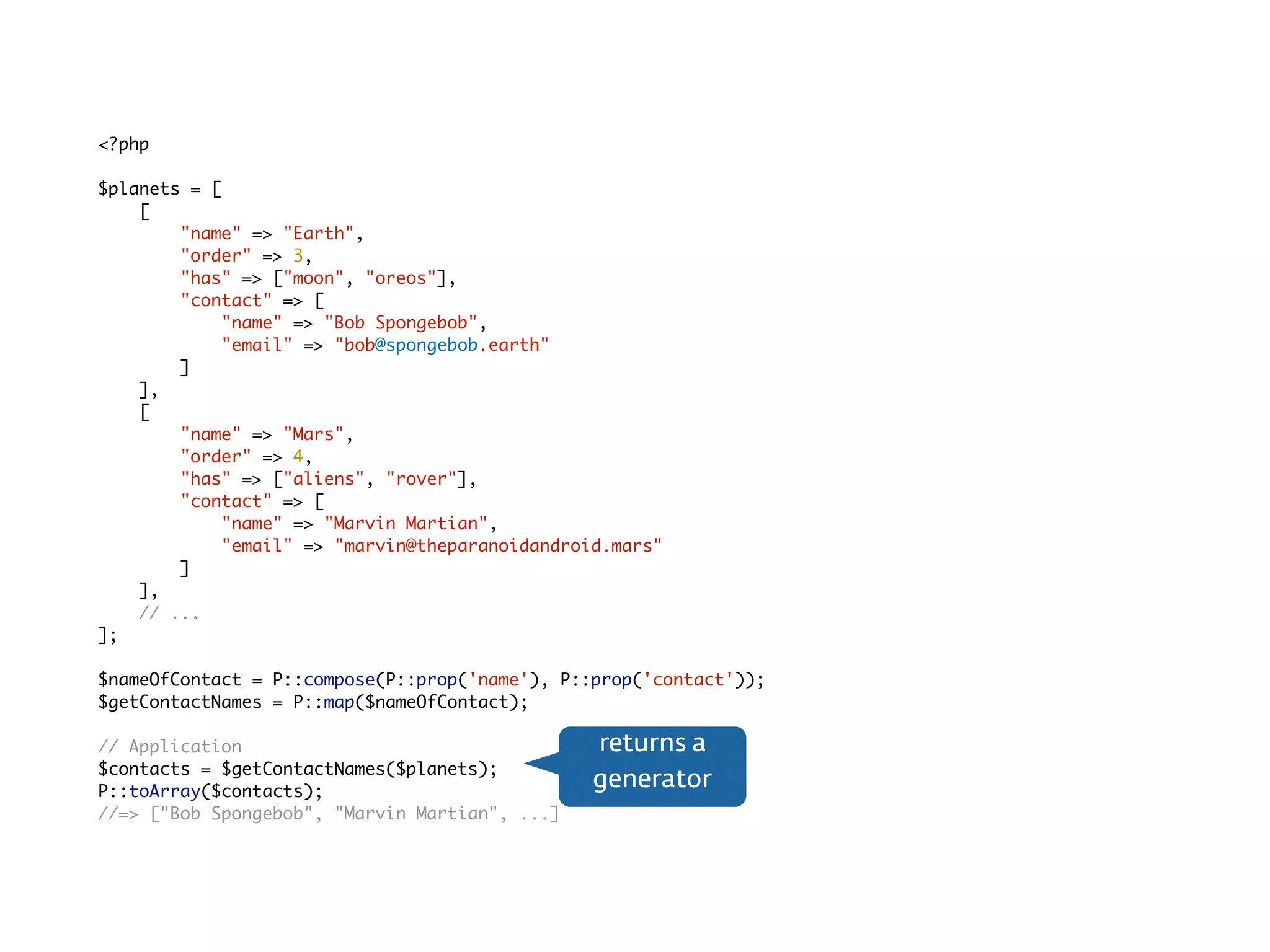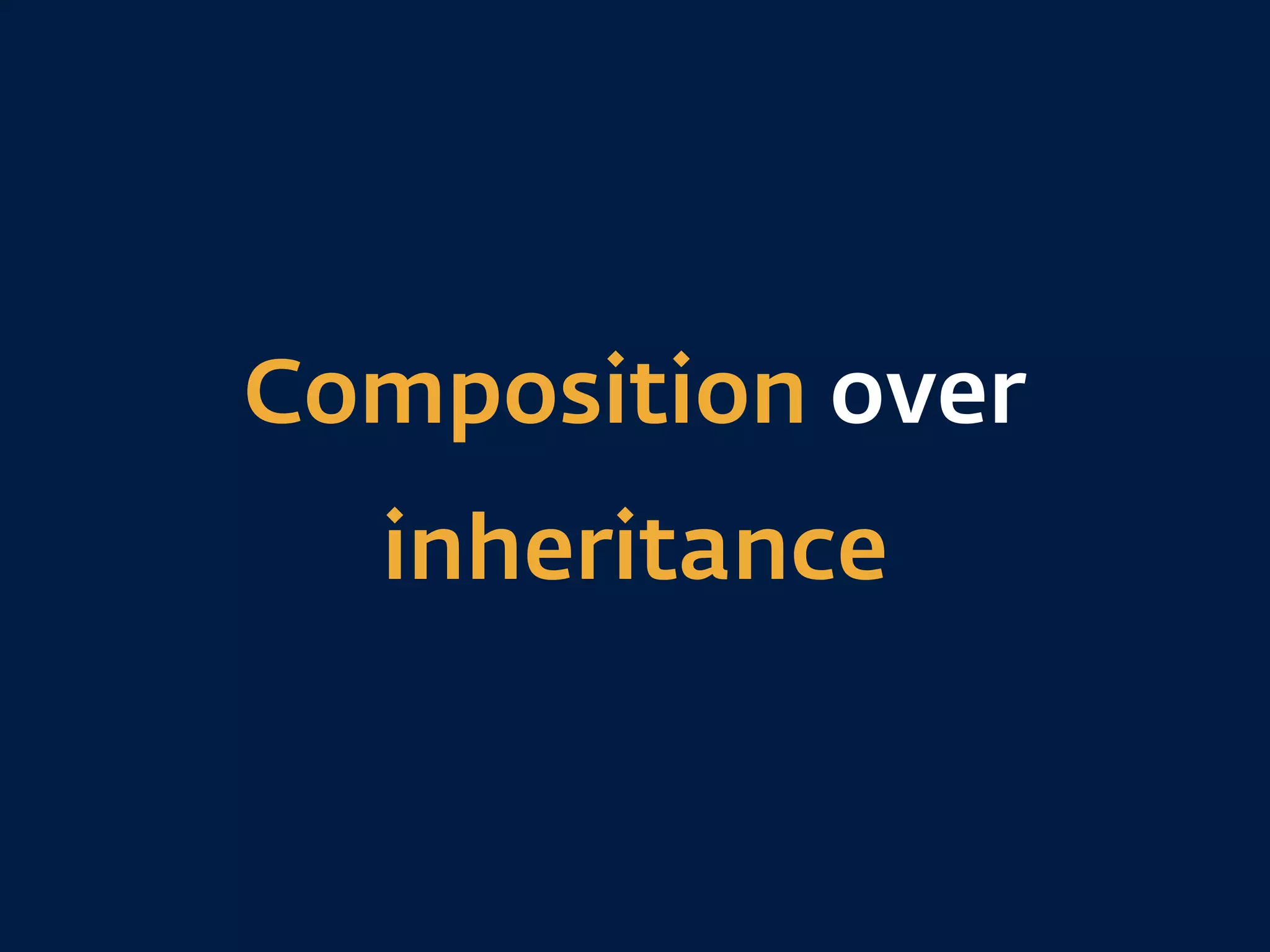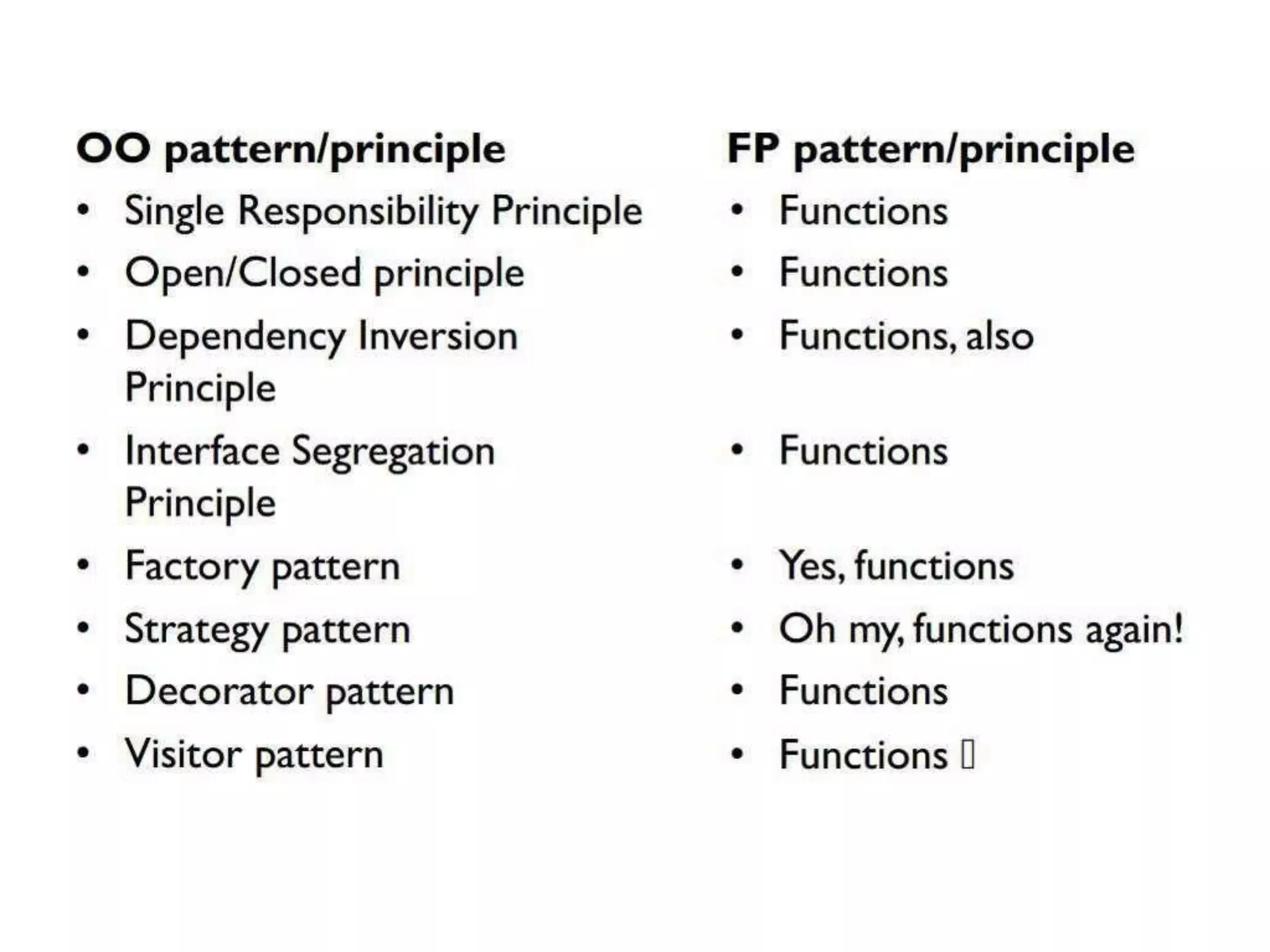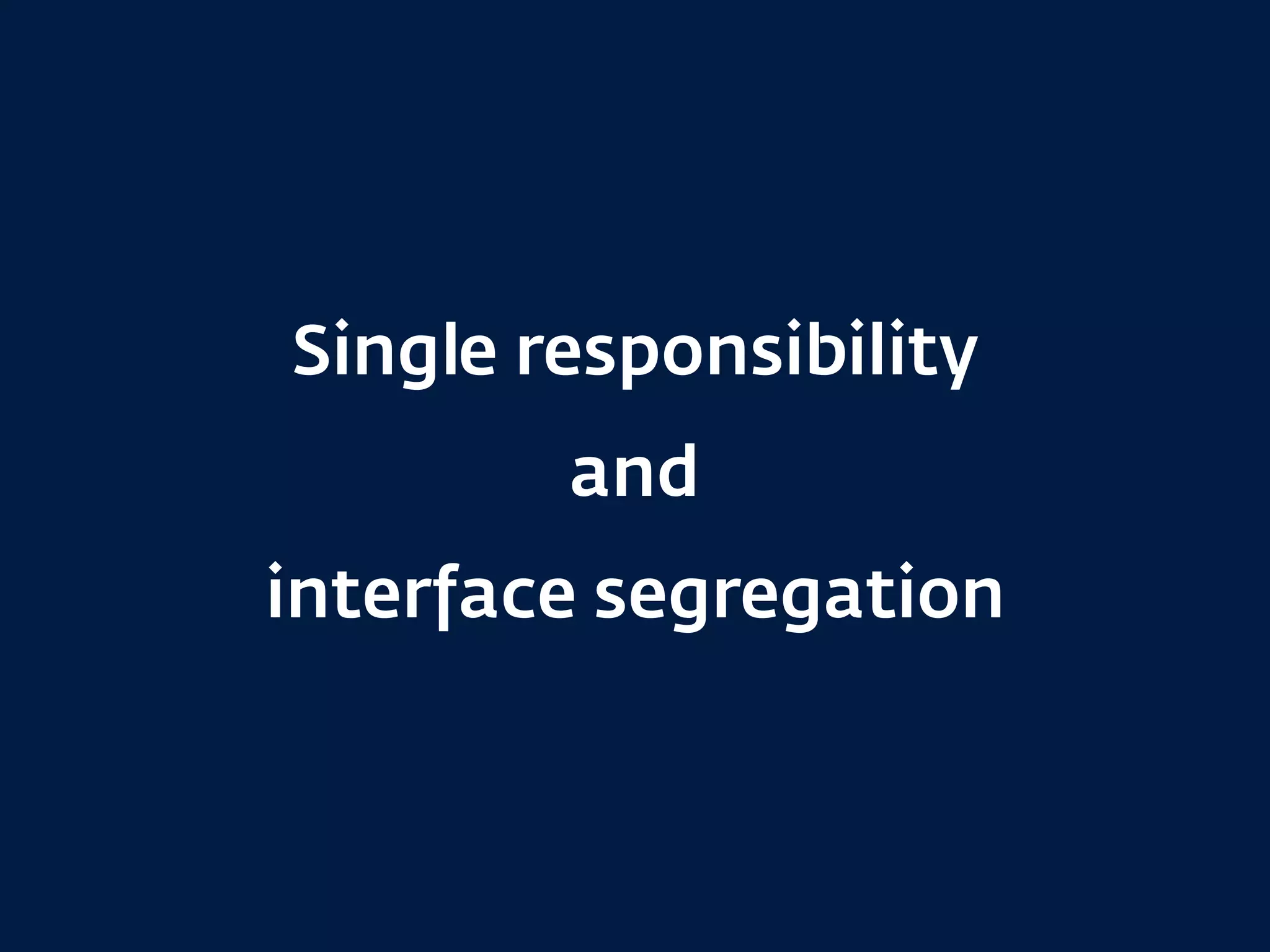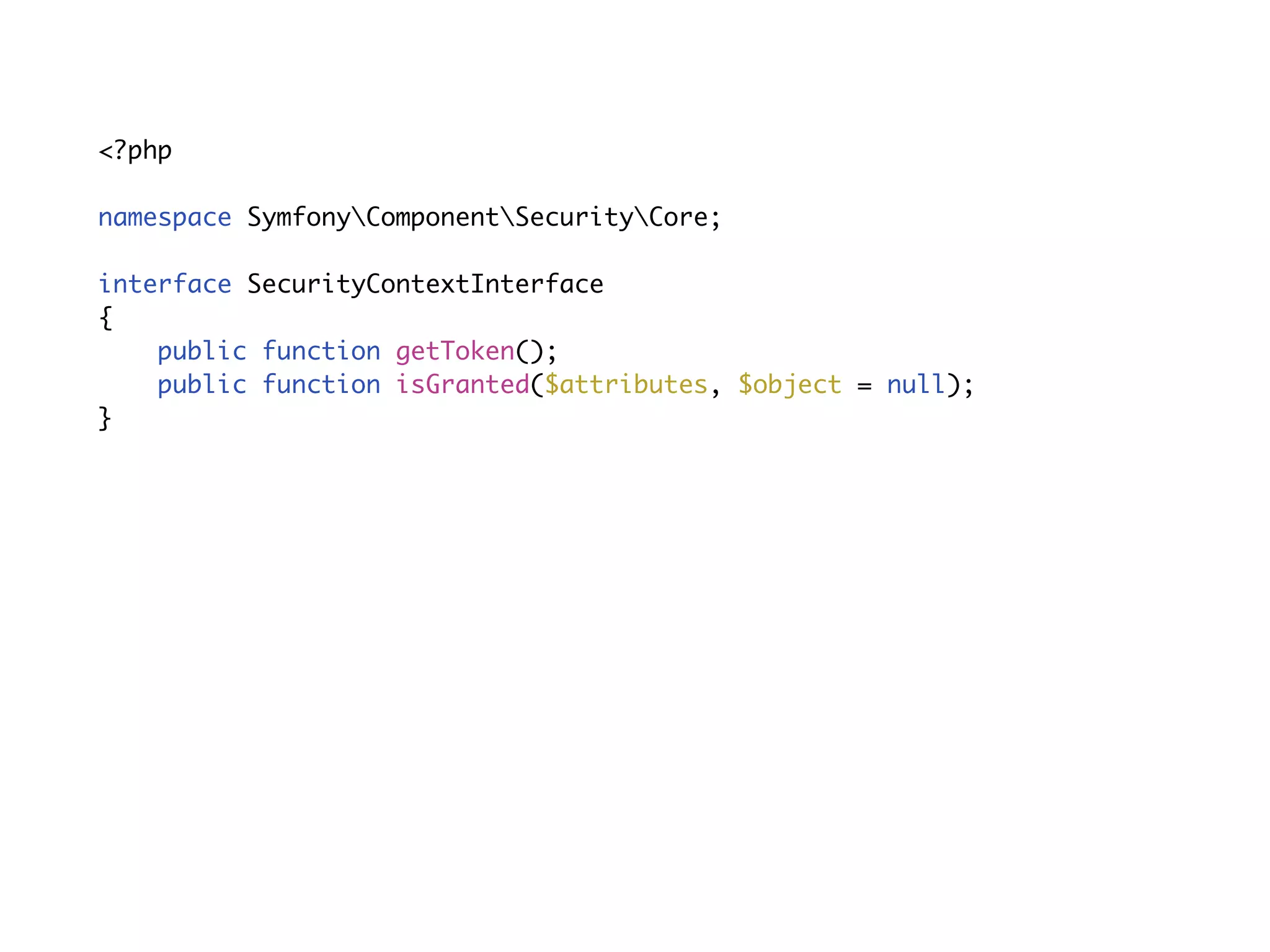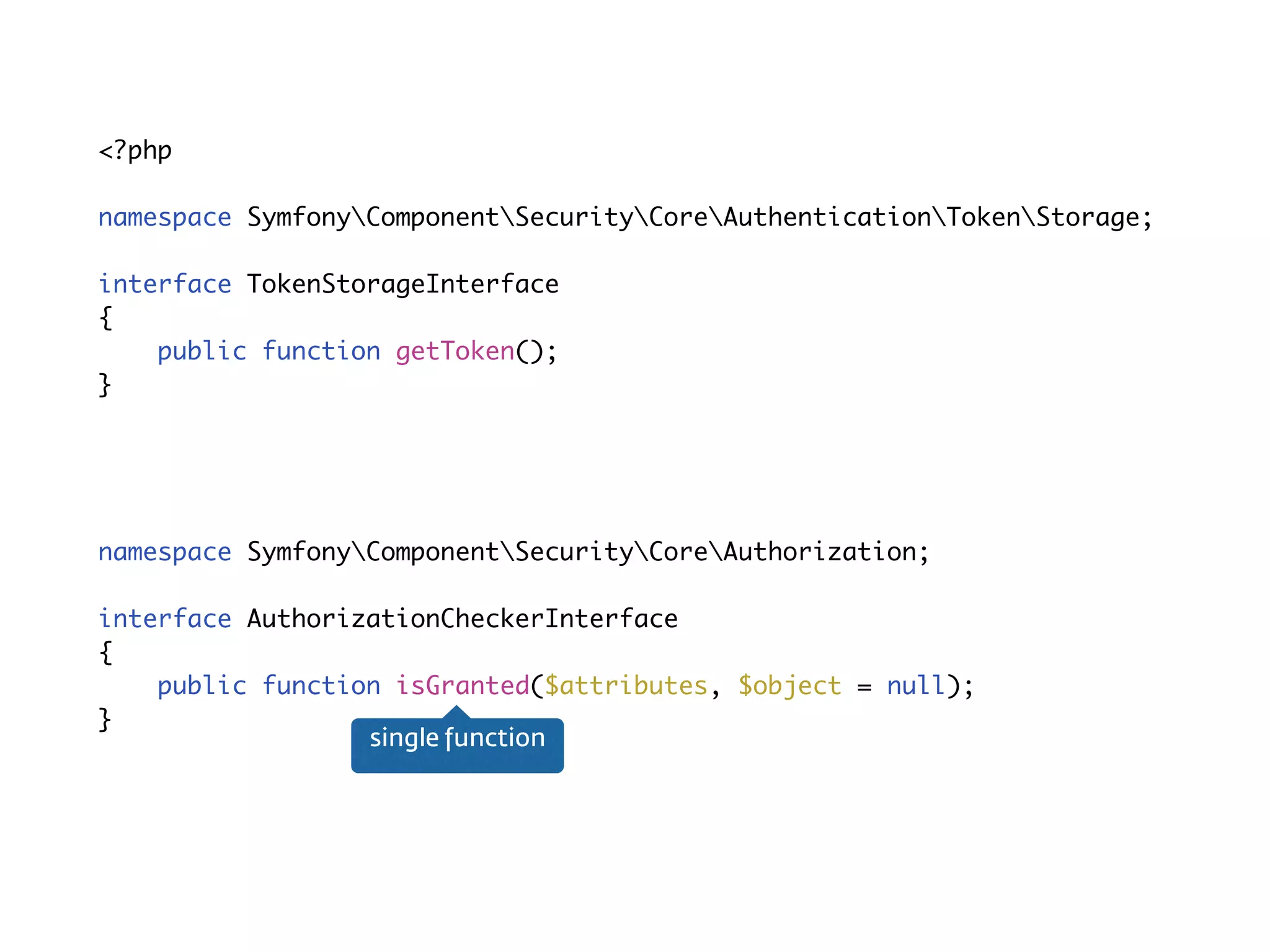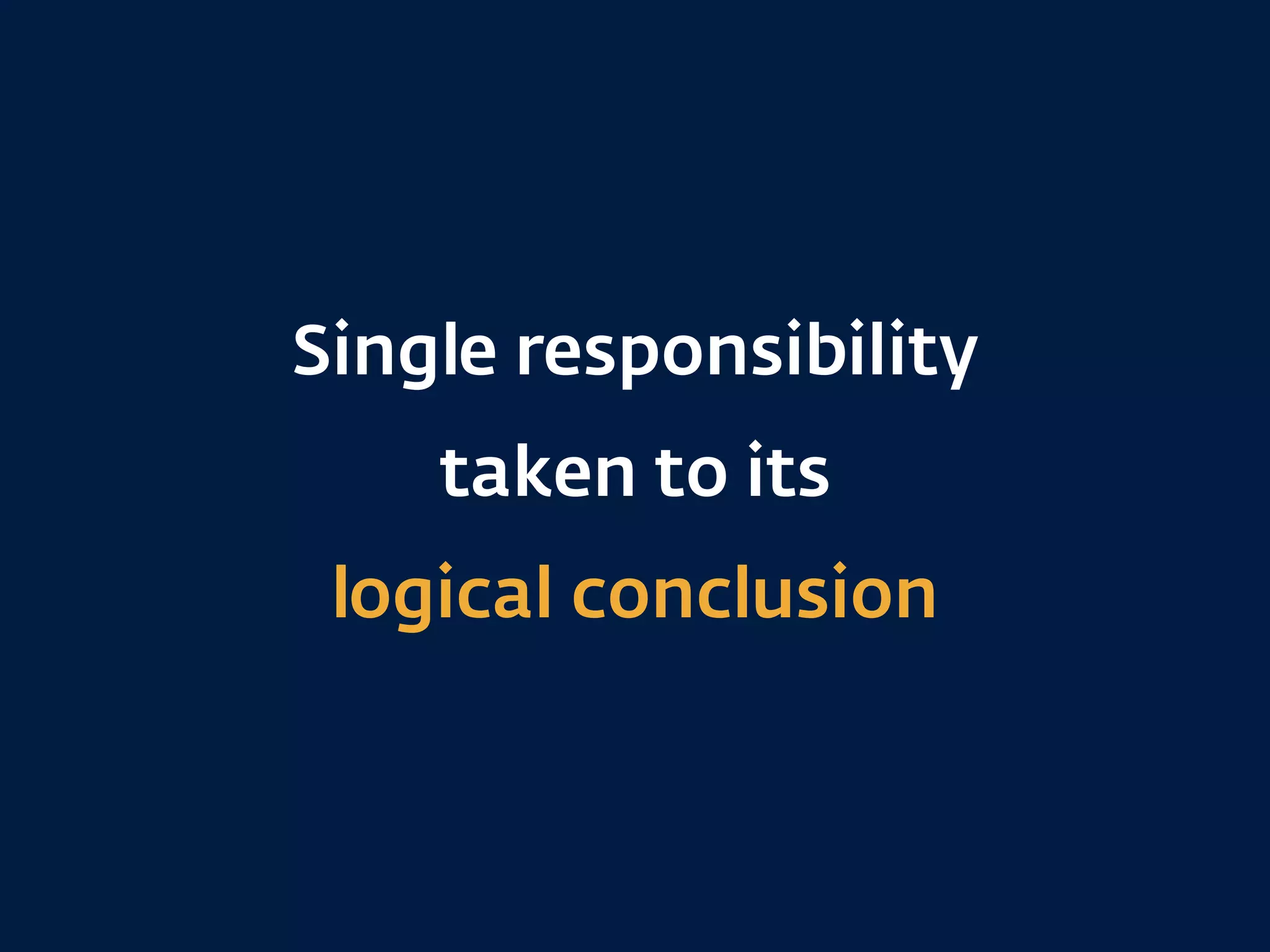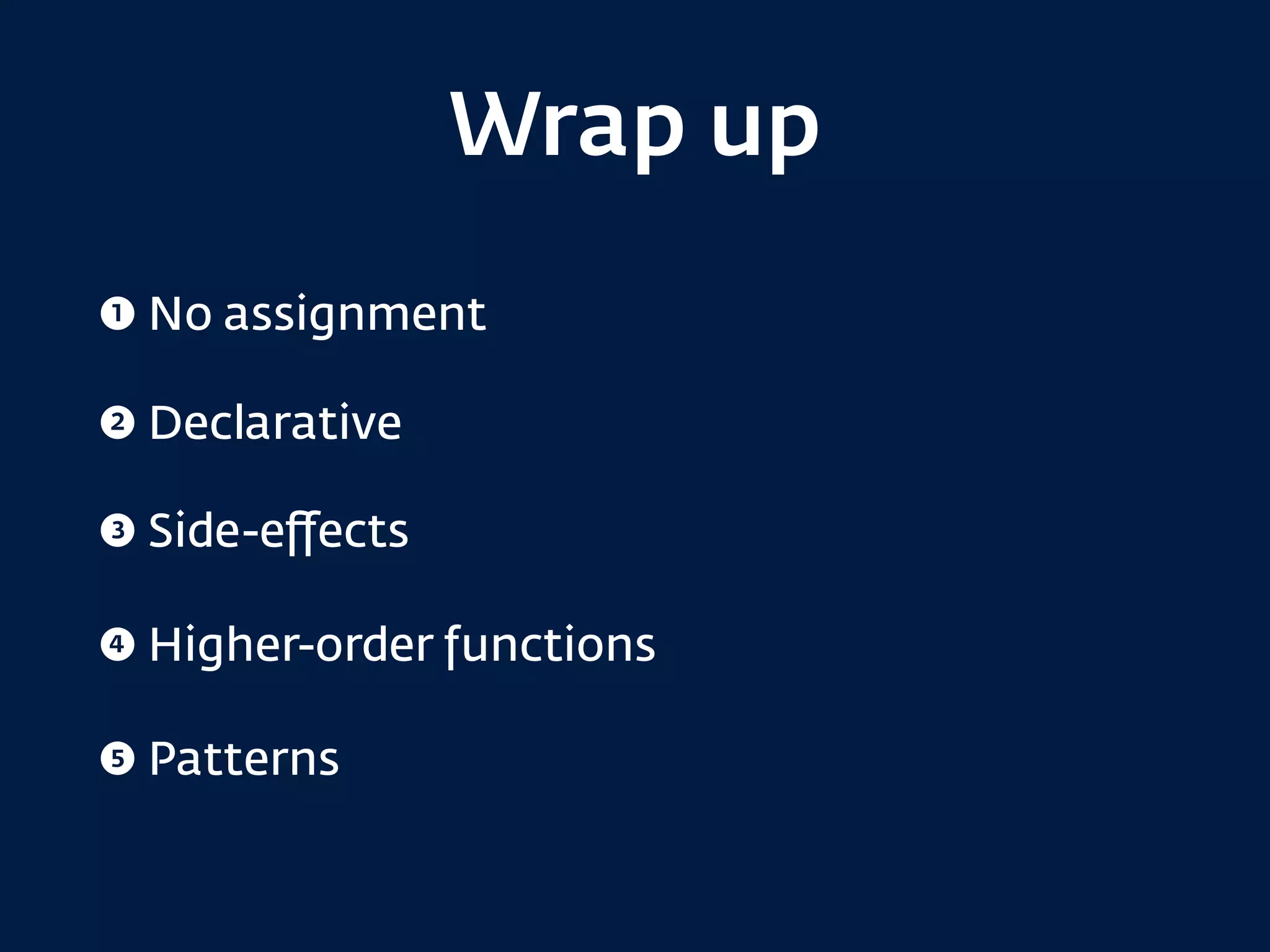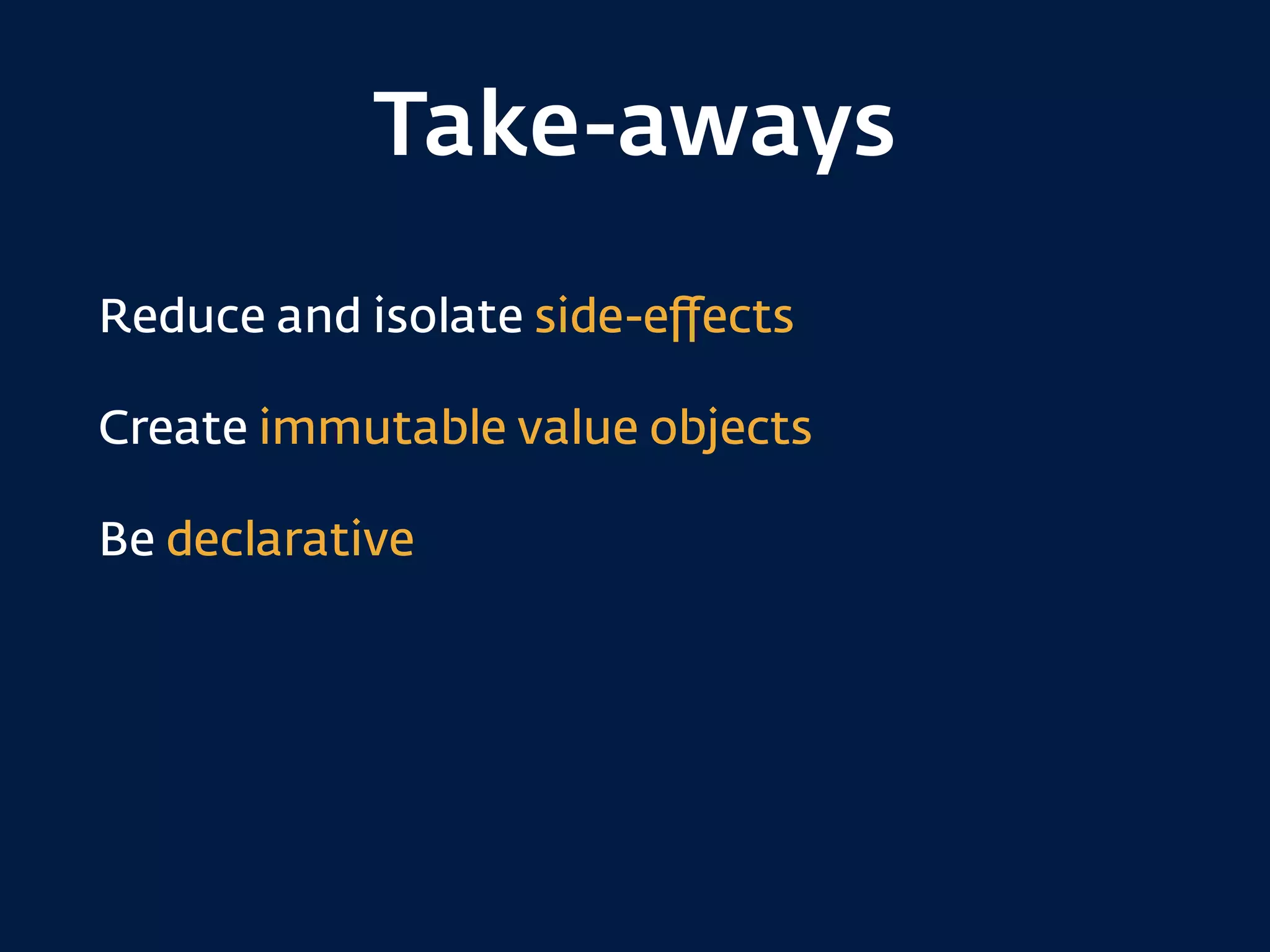The document discusses functional programming concepts in PHP, comparing them with traditional imperative programming. It highlights key concepts such as recursion, higher-order functions, and the importance of immutability and side-effects in programming. The content emphasizes embracing functional thinking to better address programming challenges, along with practical examples and code implementations.
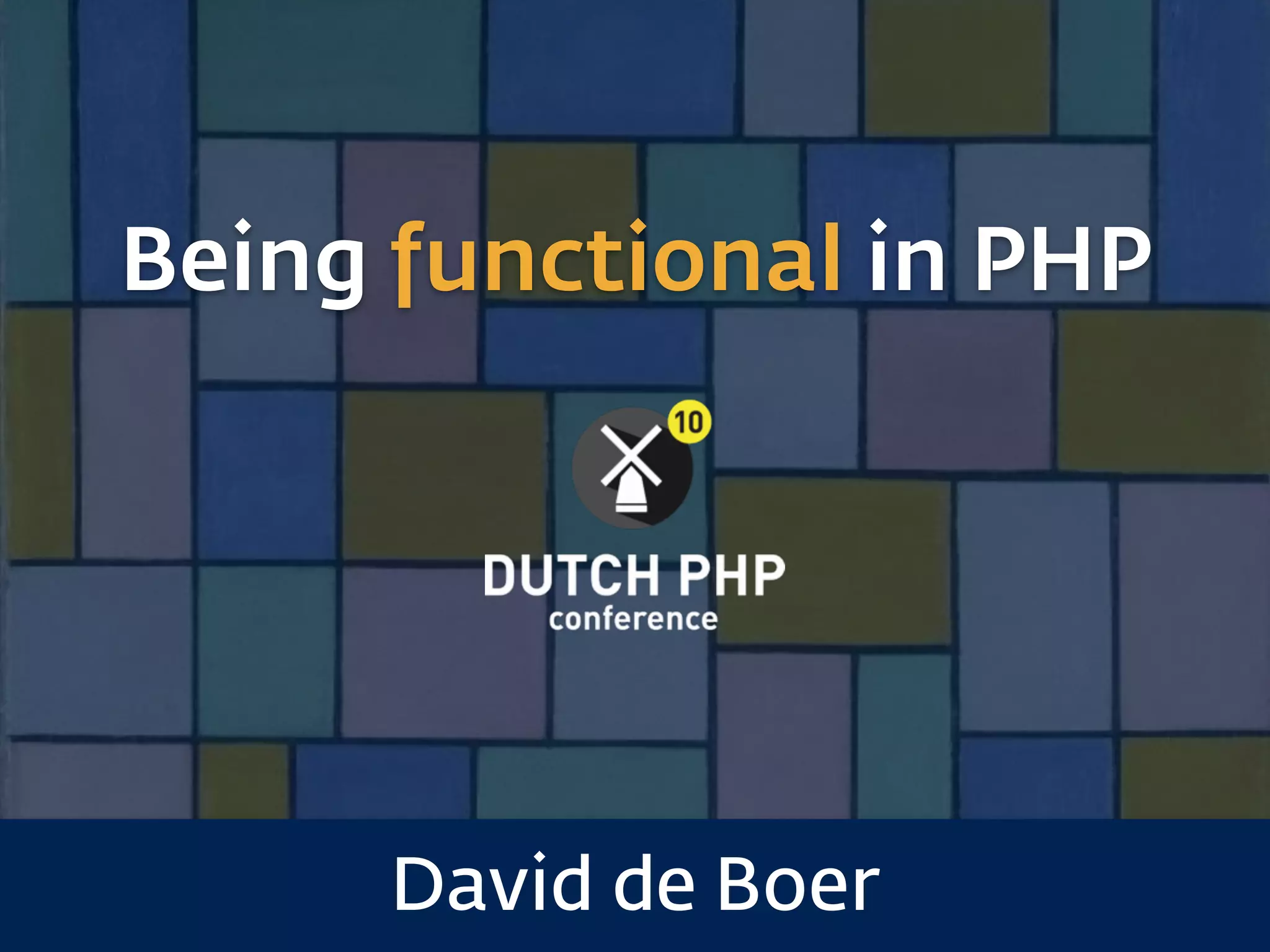

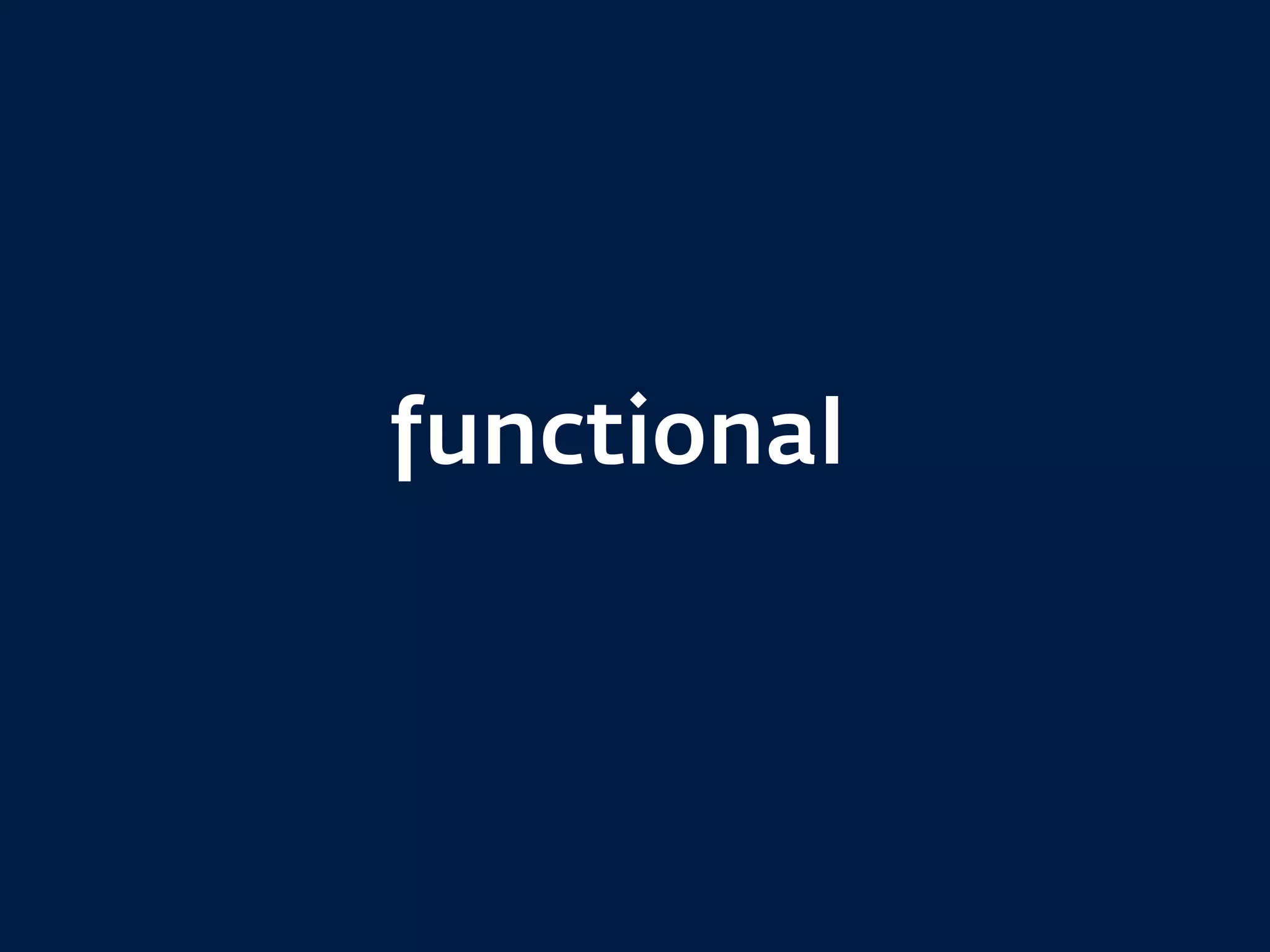

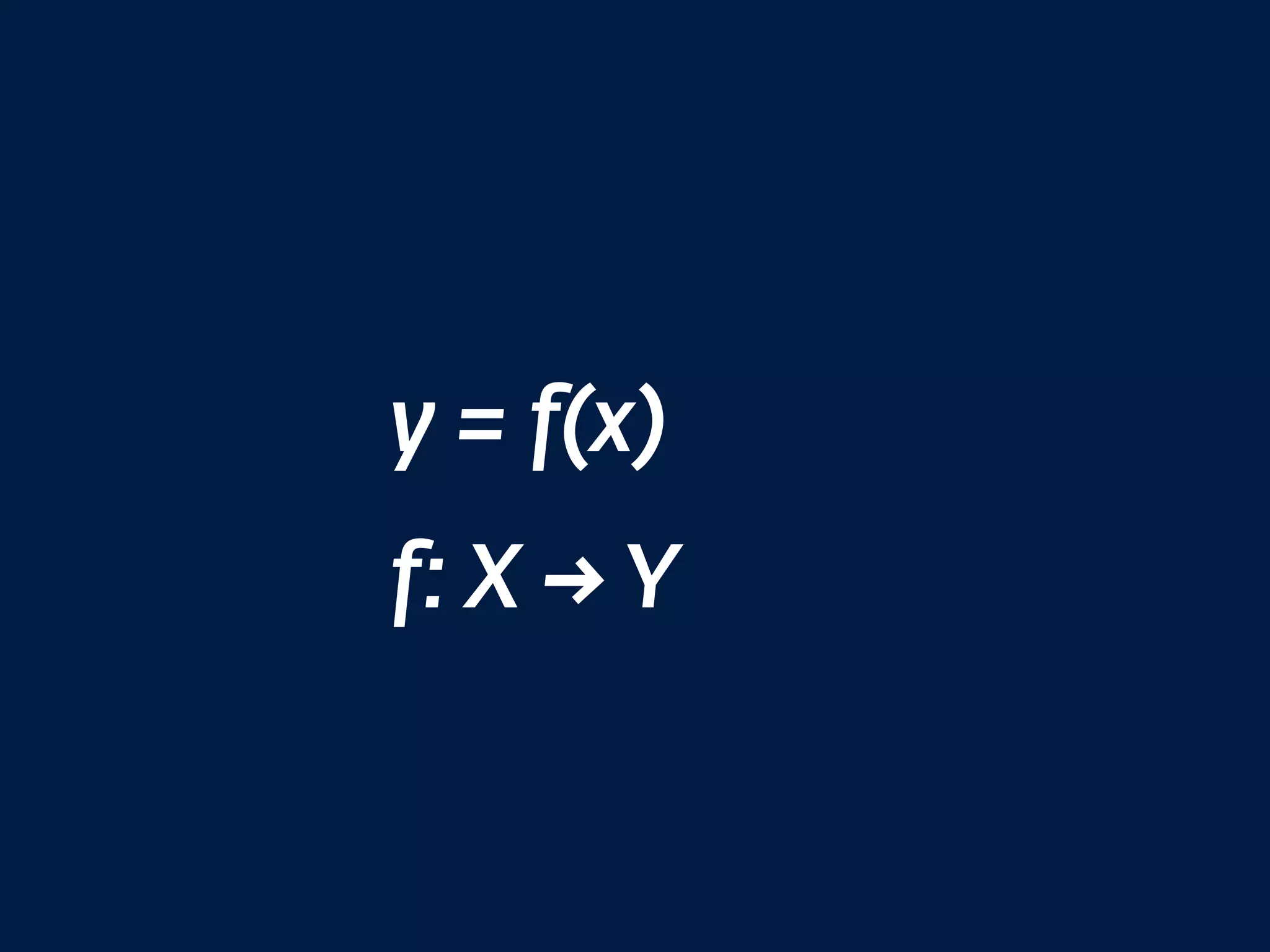
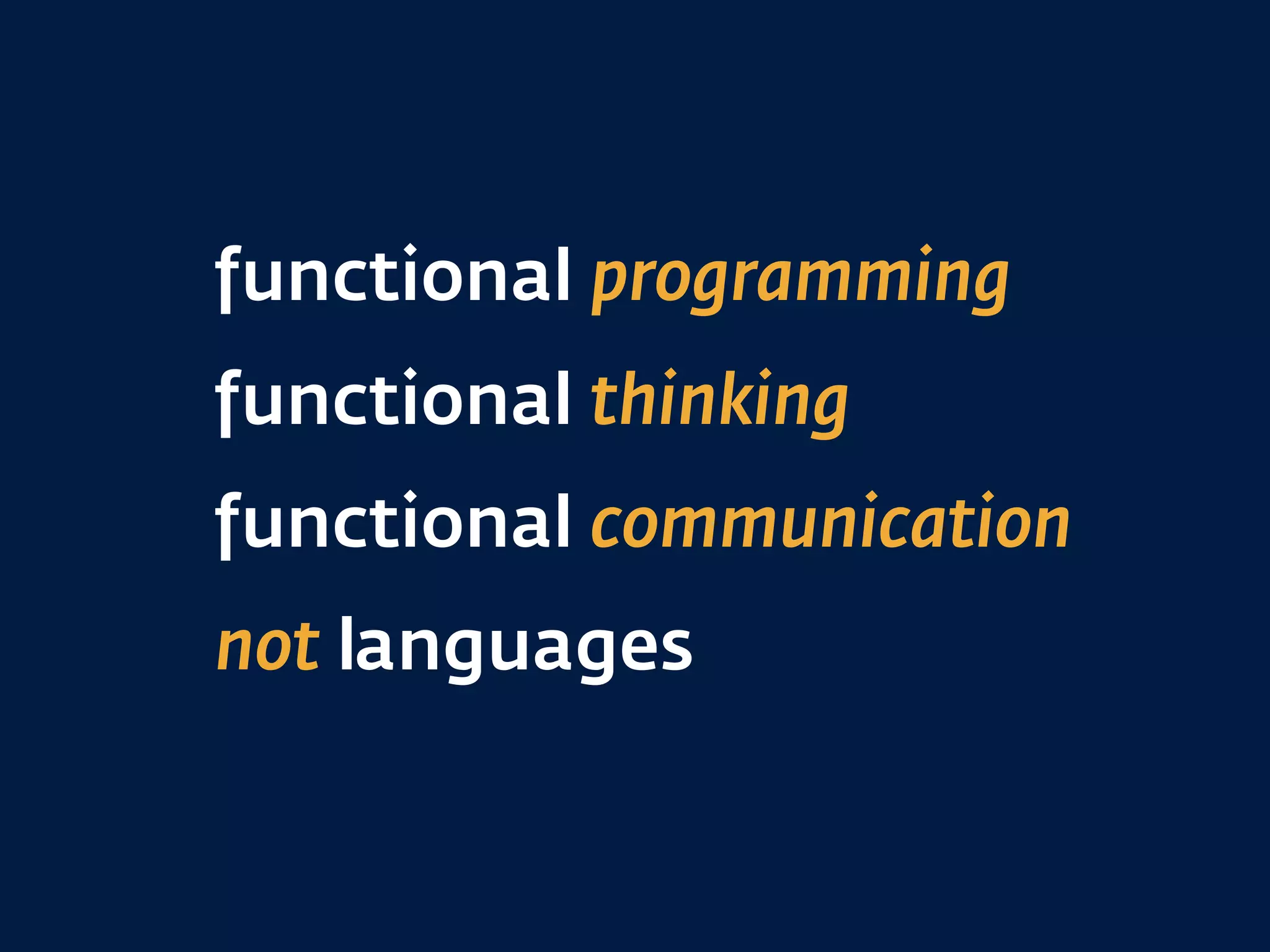



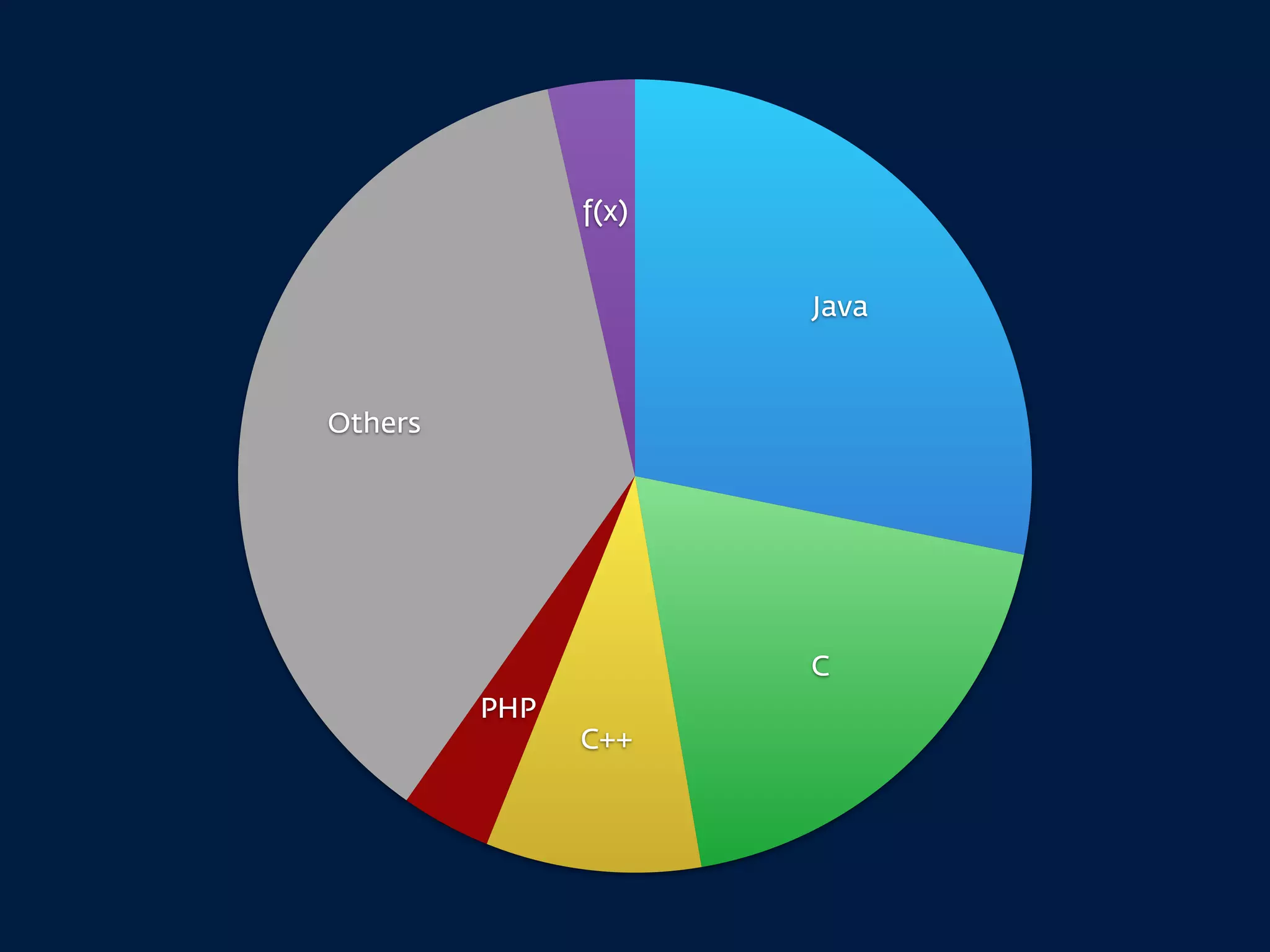

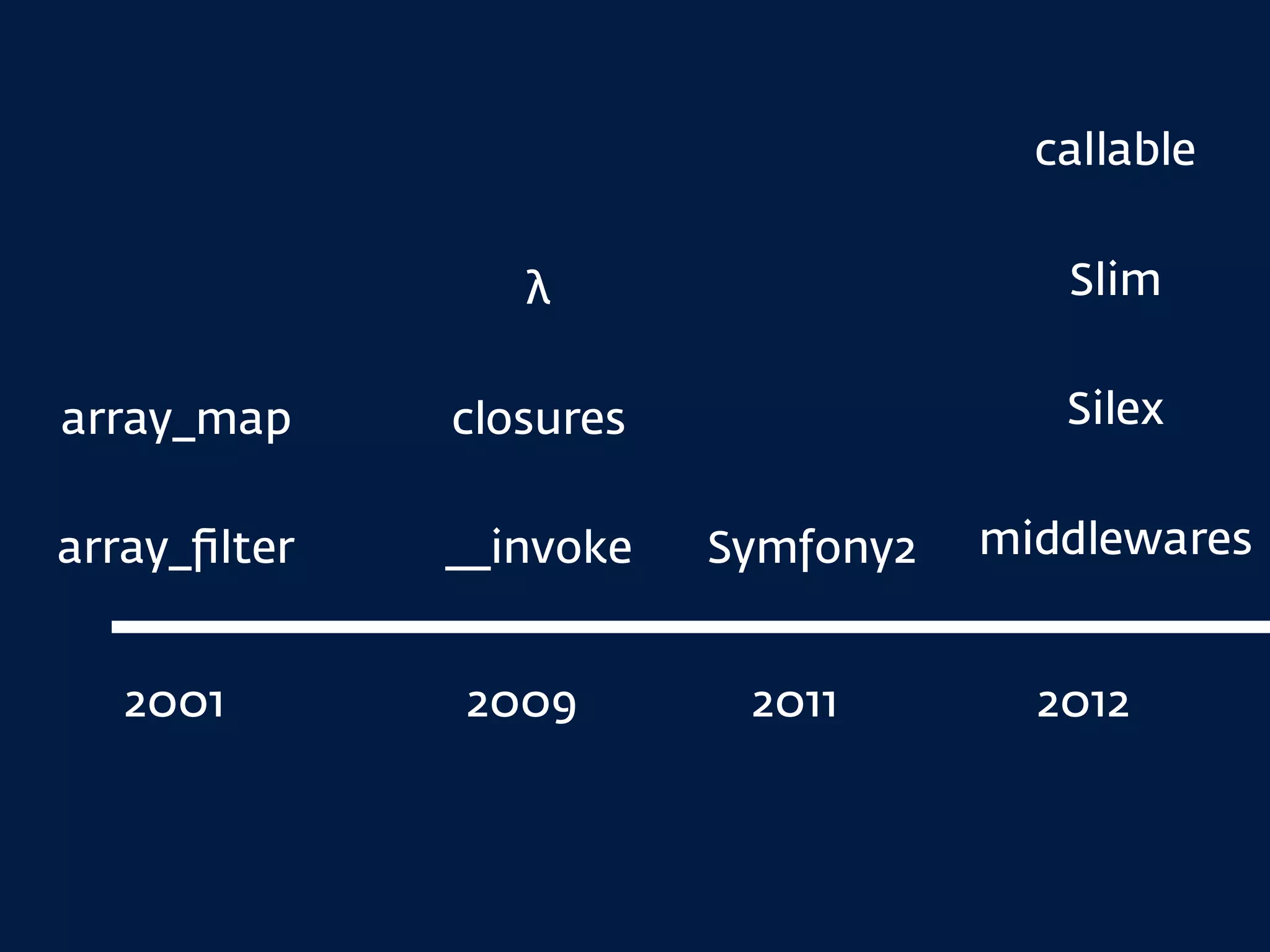
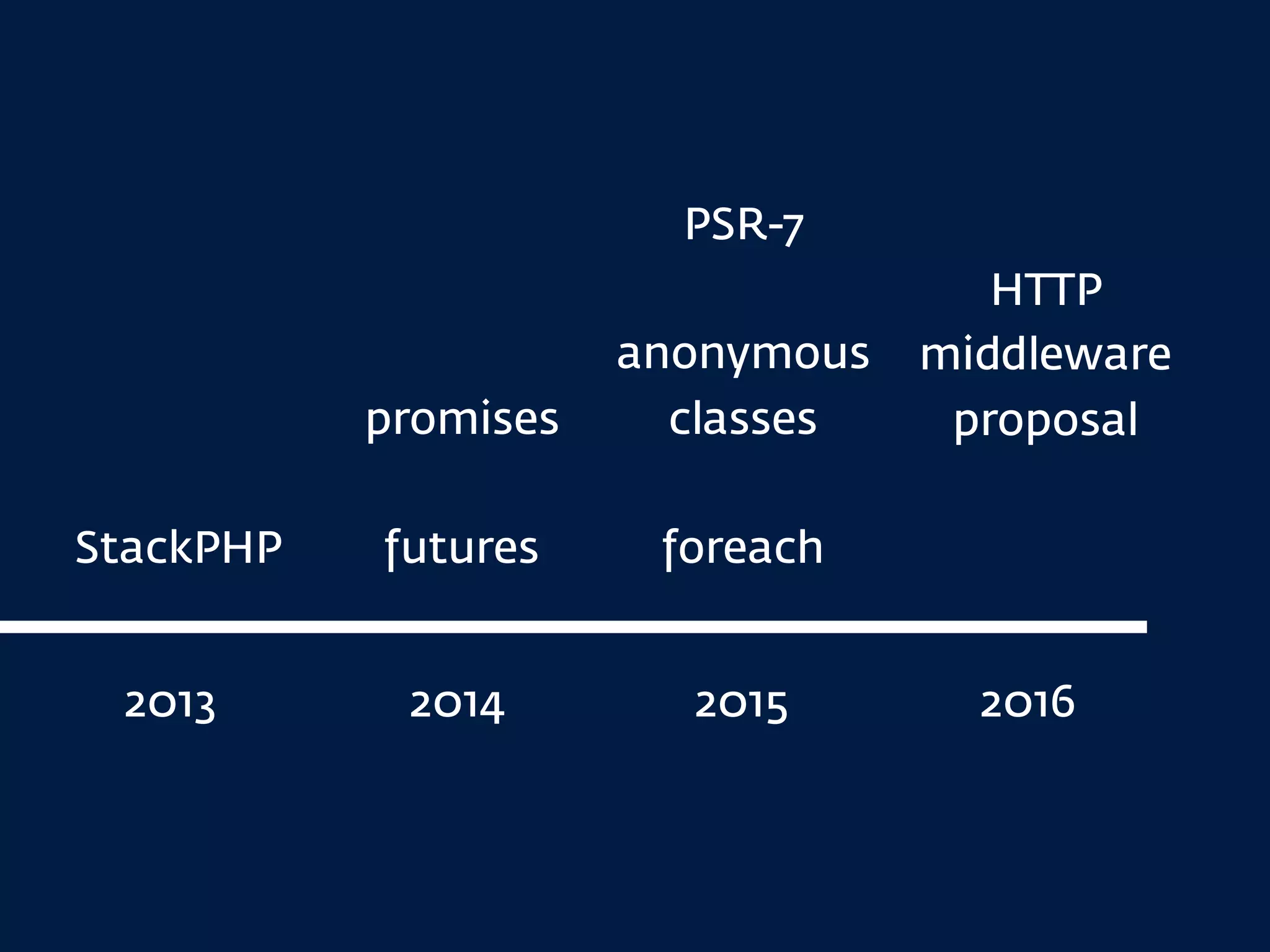

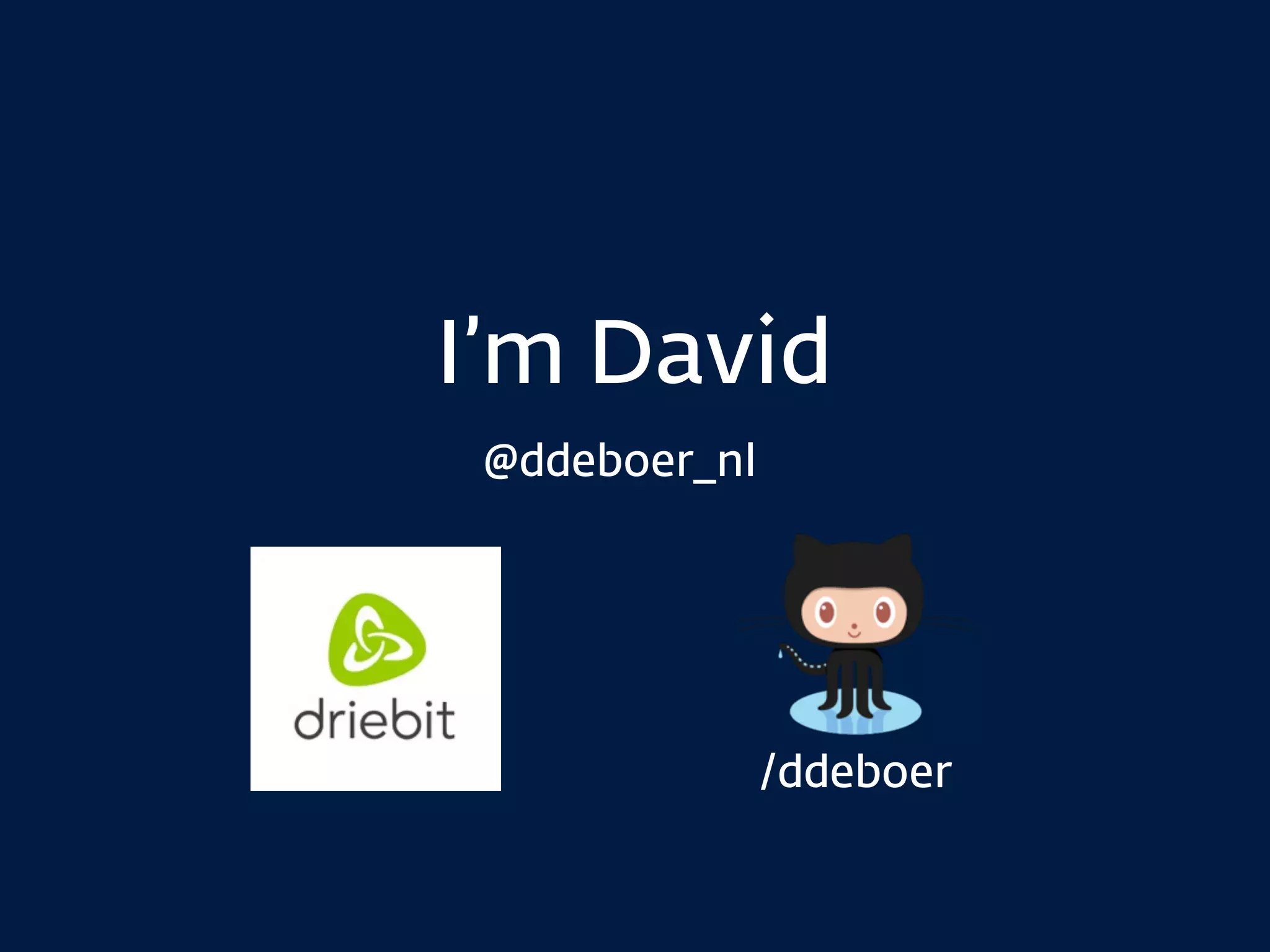


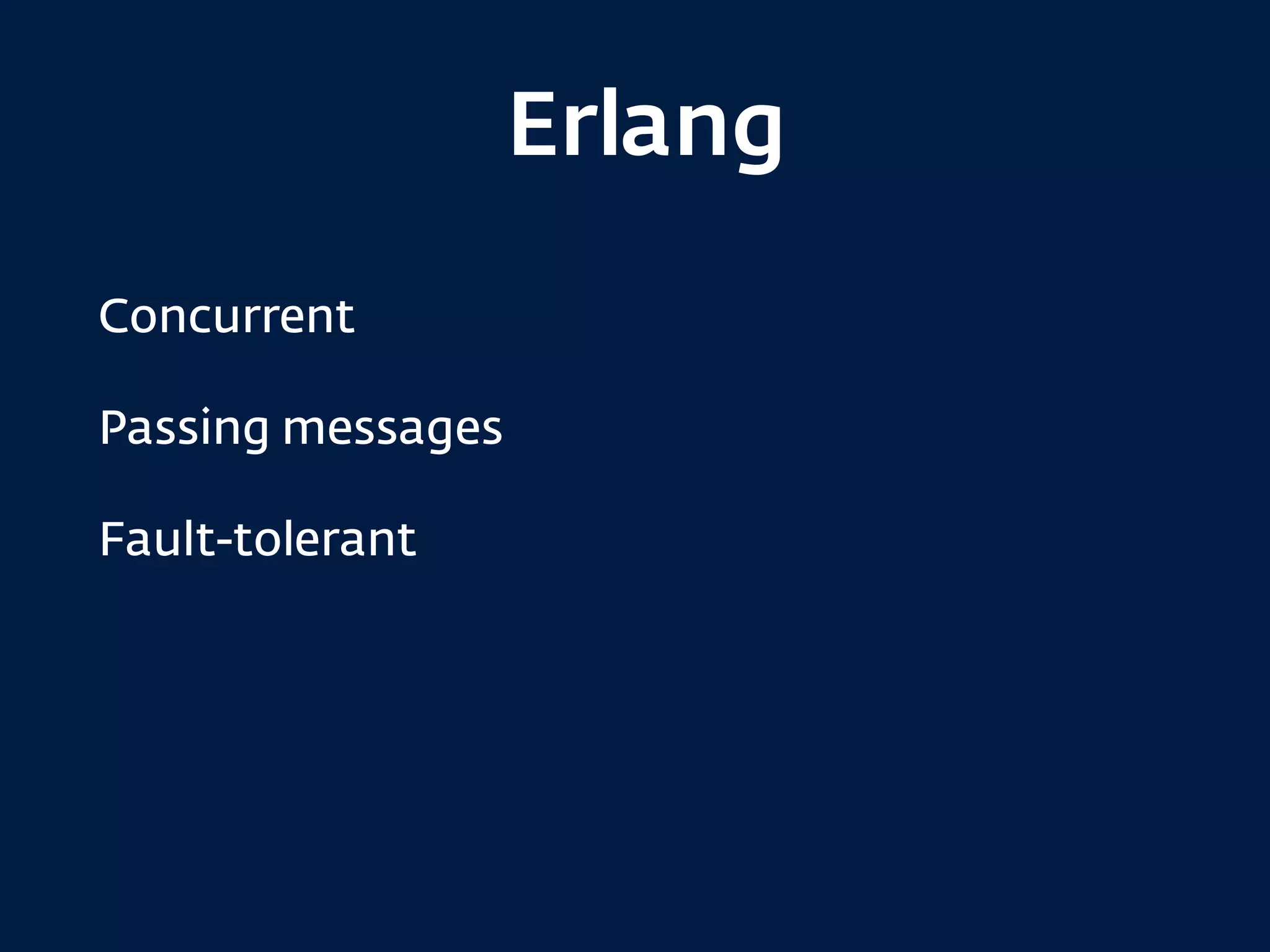
![Let’s begin$ brew install erlang
$ erl
Erlang/OTP 18 [erts-7.2.1] [source] [64-bit] [smp:4:4] [async-threads:
10] [hipe] [kernel-poll:false] [dtrace]
Eshell V7.2.1 (abort with ^G)
1>
on OS X
REPL](https://image.slidesharecdn.com/beingfunctionalinphpdpc2016-160625091624/75/Being-functional-in-PHP-DPC-2016-19-2048.jpg)

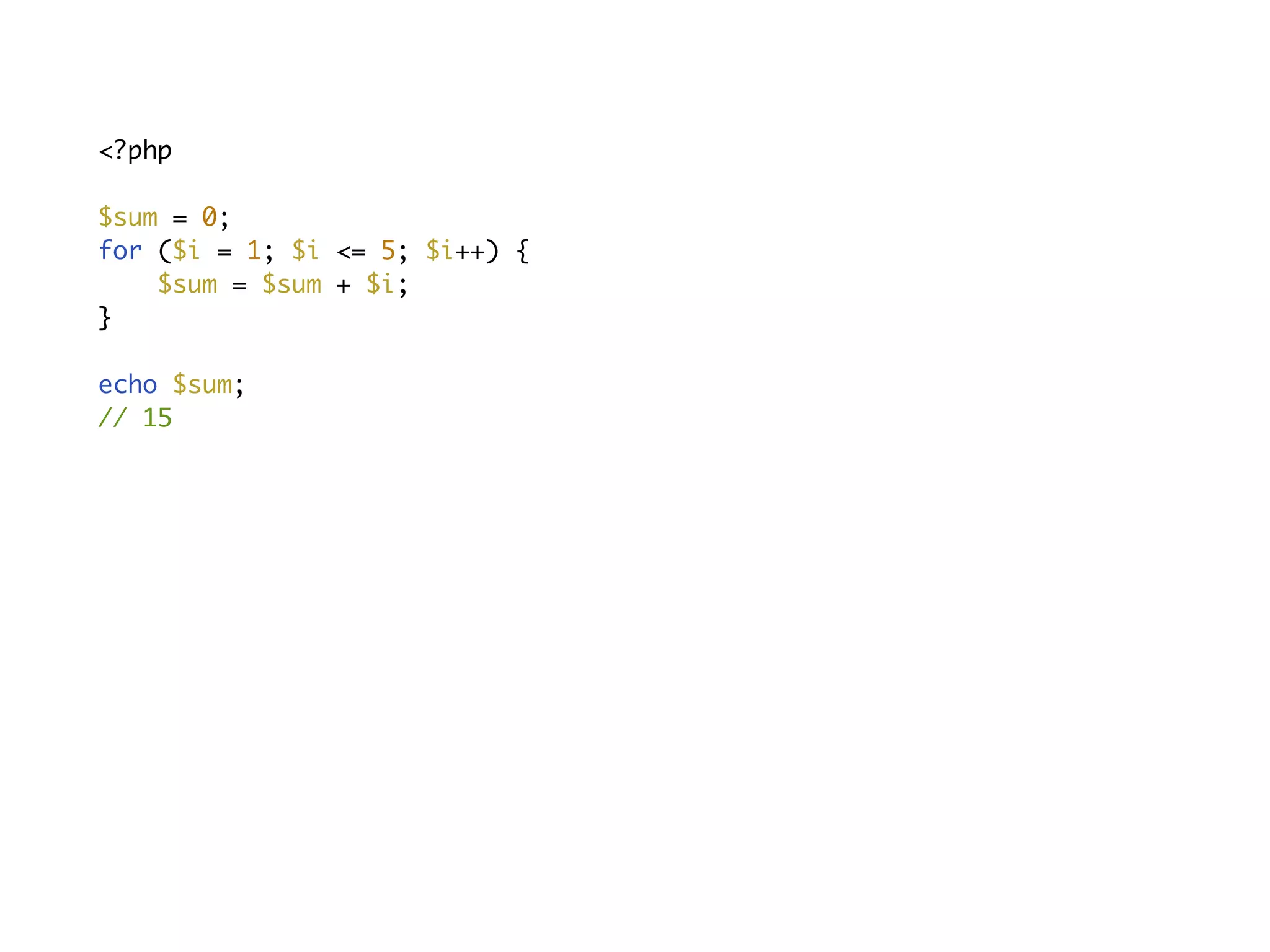
![-module(math).
-export([sum/1]).
sum(Number) ->
Sum = 0,
Numbers = lists:seq(1, Number),
lists:foreach(
fun(N) ->
Sum = Sum + N
end,
Numbers
),
Sum.
math:sum(5).
no return
keyword
** exception error: no match
of right hand side value 1](https://image.slidesharecdn.com/beingfunctionalinphpdpc2016-160625091624/75/Being-functional-in-PHP-DPC-2016-22-2048.jpg)
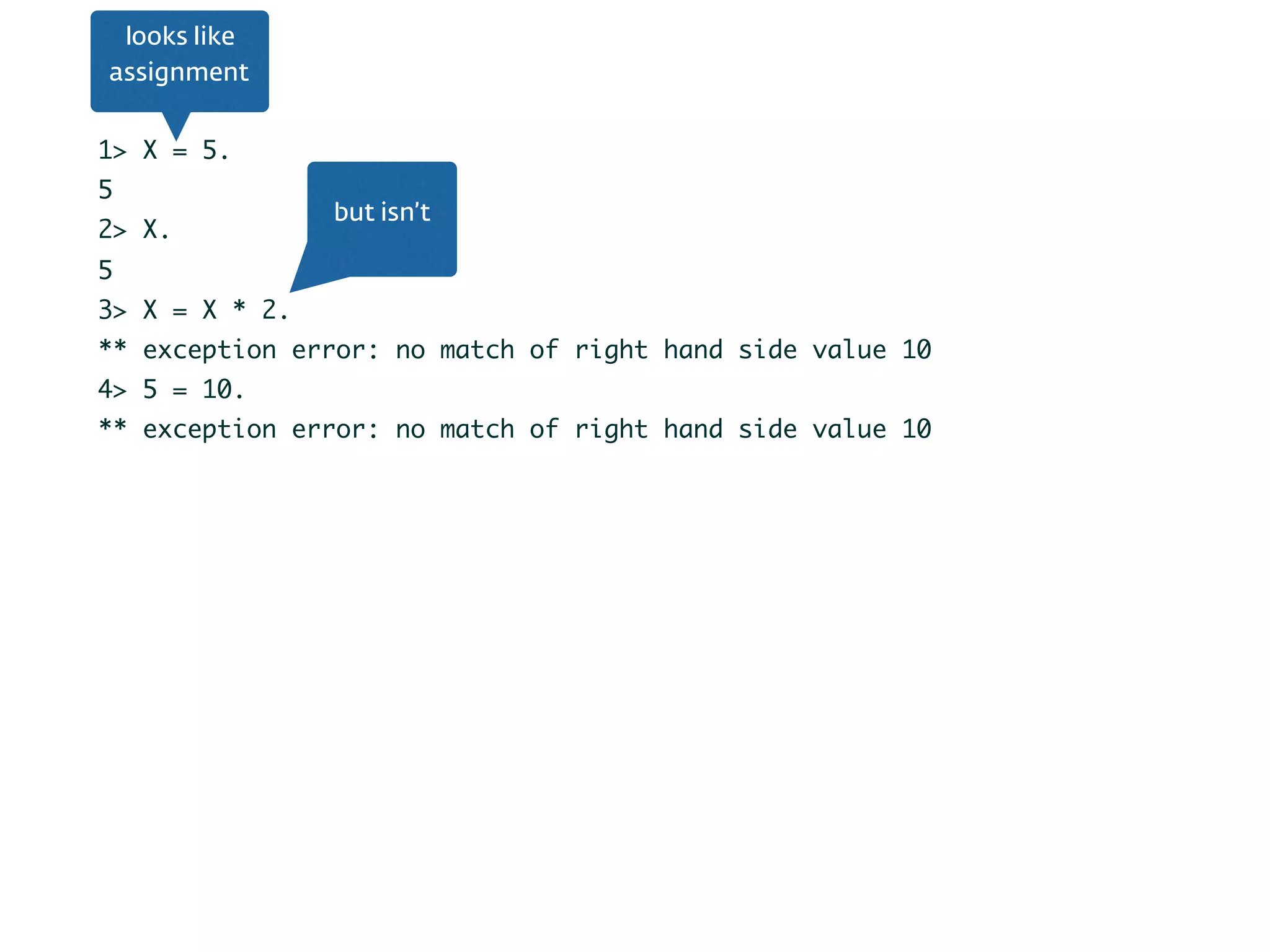
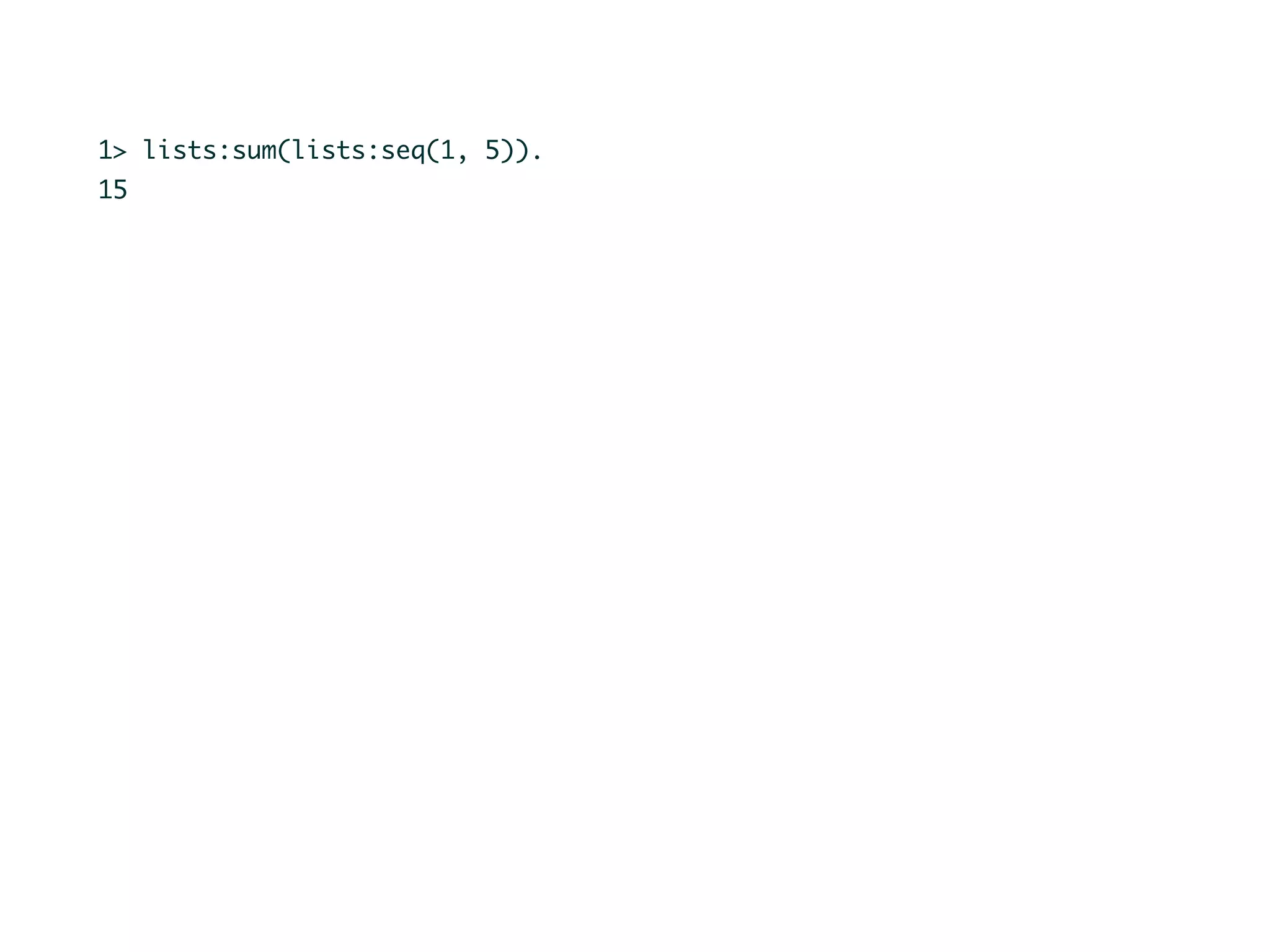

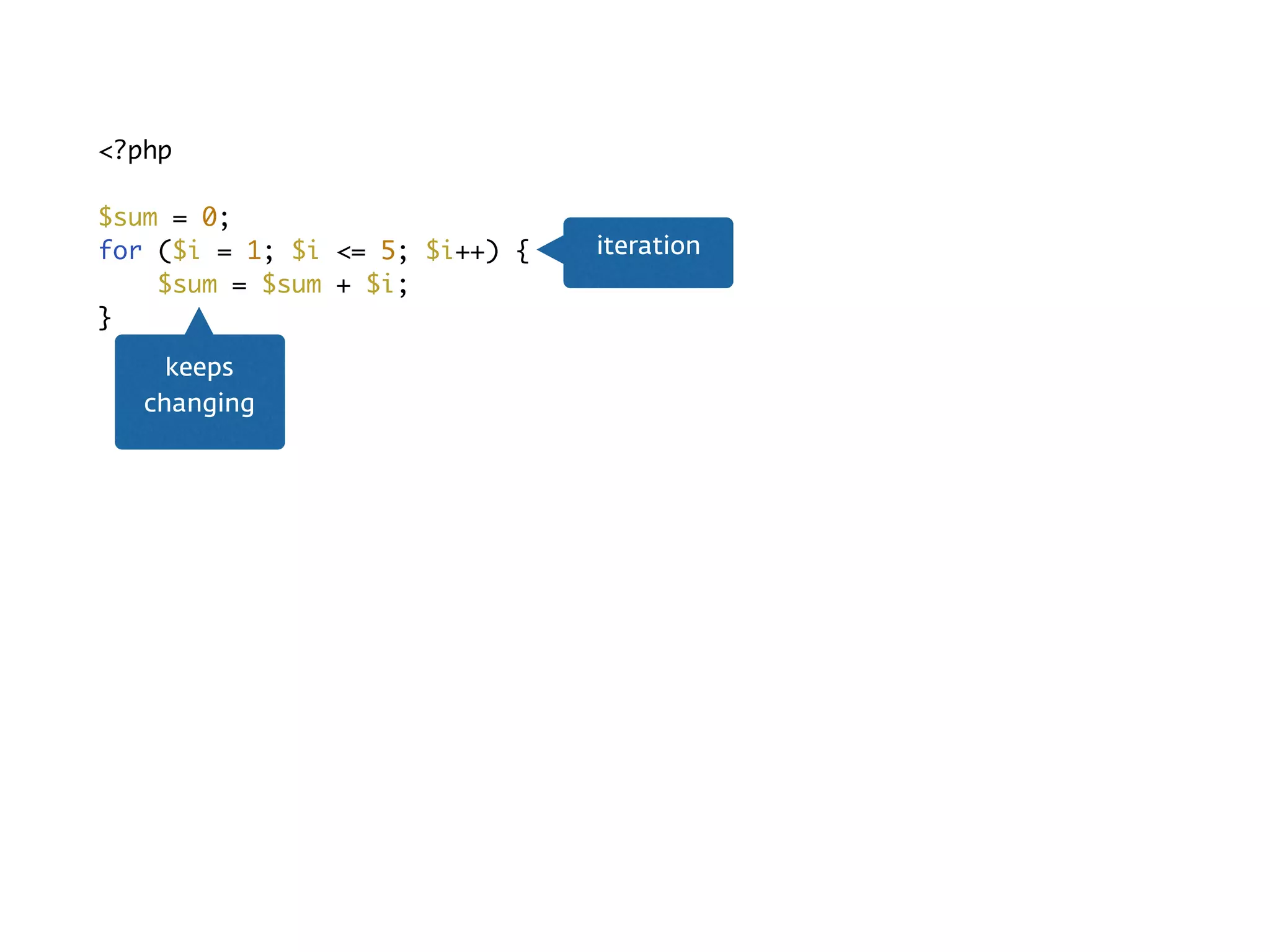
![-module(math2).
-export([sum2/1]).
sum2(Number) ->
List = lists:seq(1, Number),
sum2(List, 0).
sum2([], Sum) -> Sum;
sum2([H|T], Sum) -> sum2(T, H + Sum).
3> math2:sum(5).
15
empty list
separate head from tail recurse
pattern
matches
generate list](https://image.slidesharecdn.com/beingfunctionalinphpdpc2016-160625091624/75/Being-functional-in-PHP-DPC-2016-27-2048.jpg)
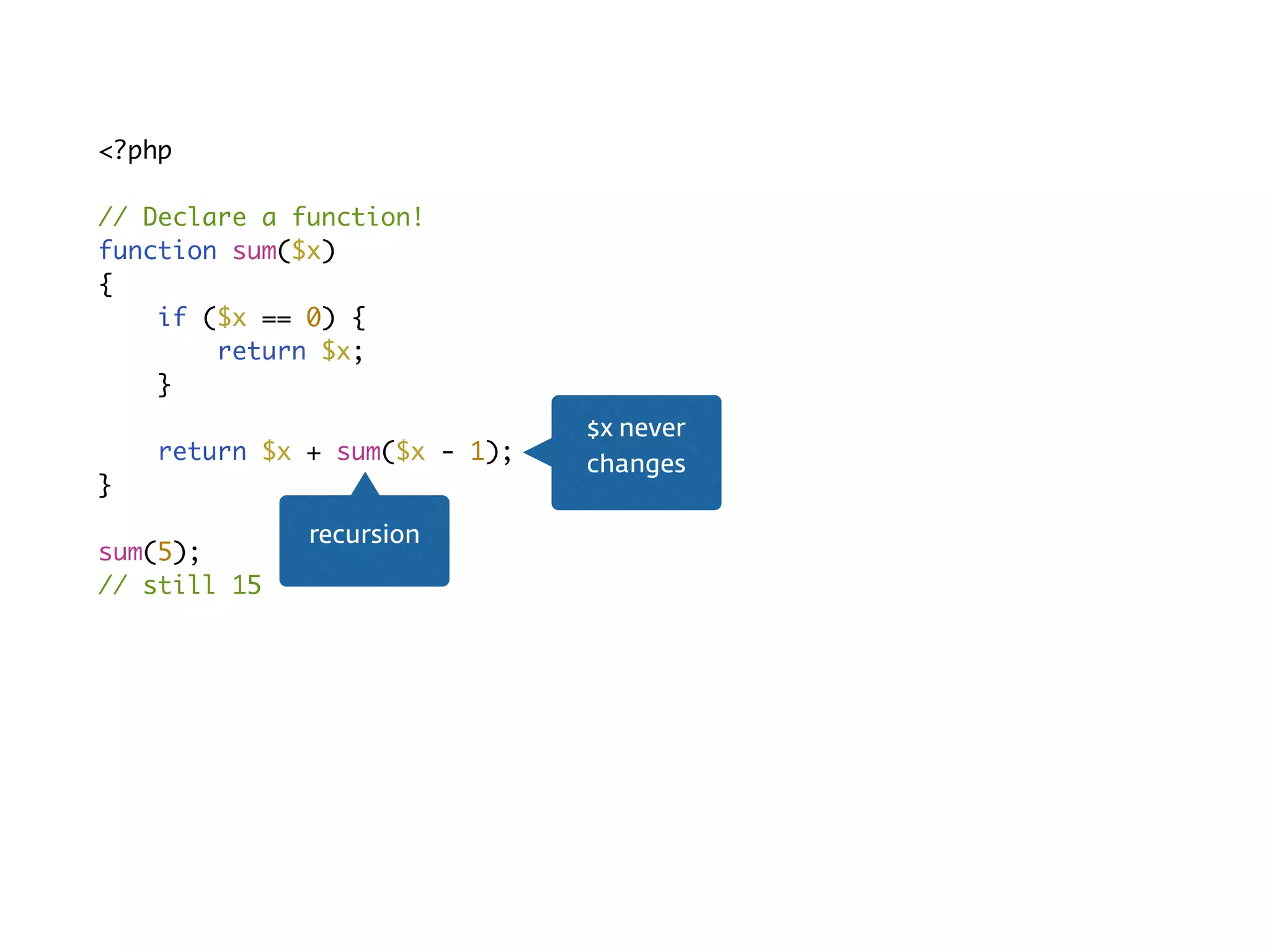
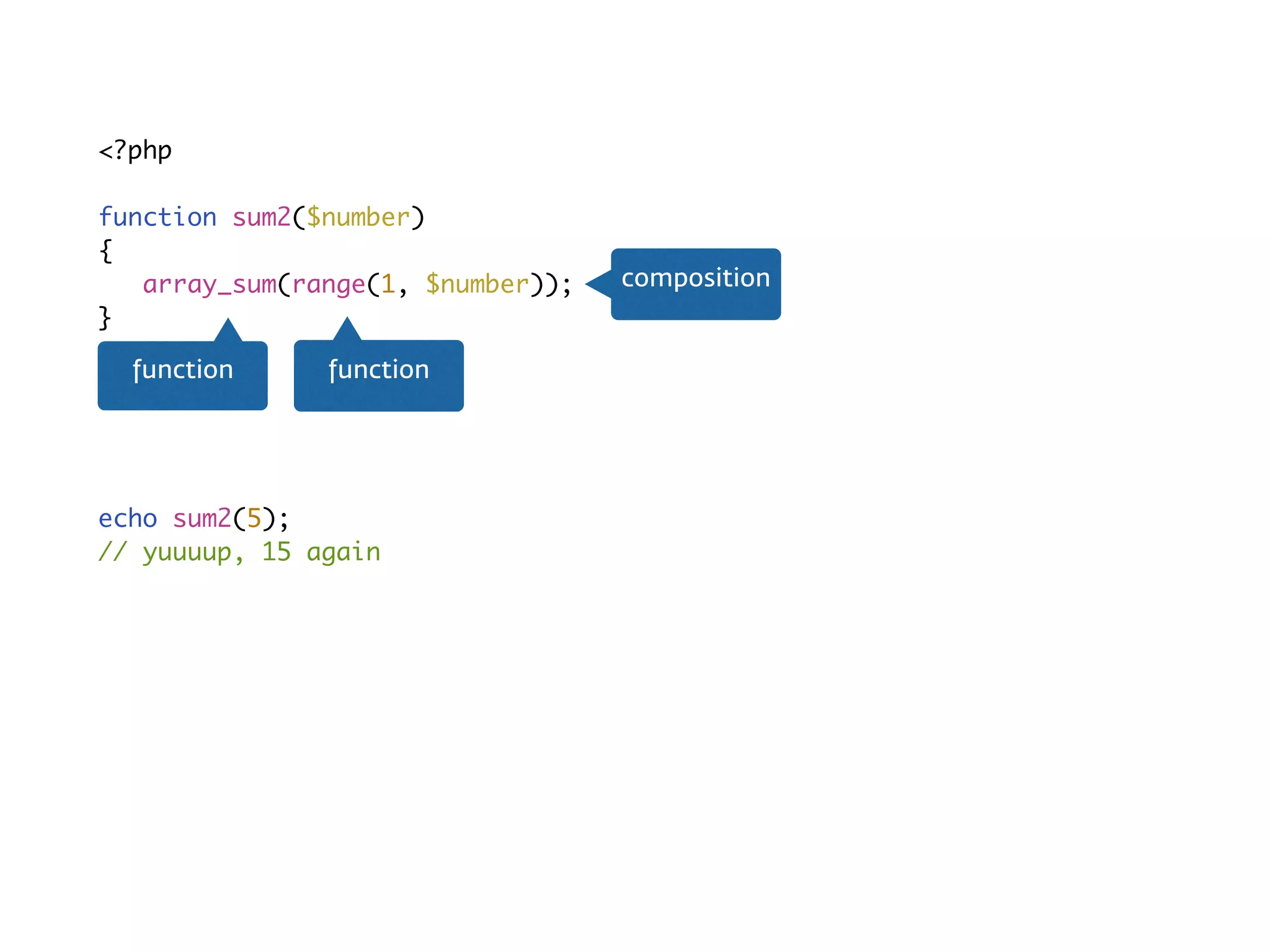

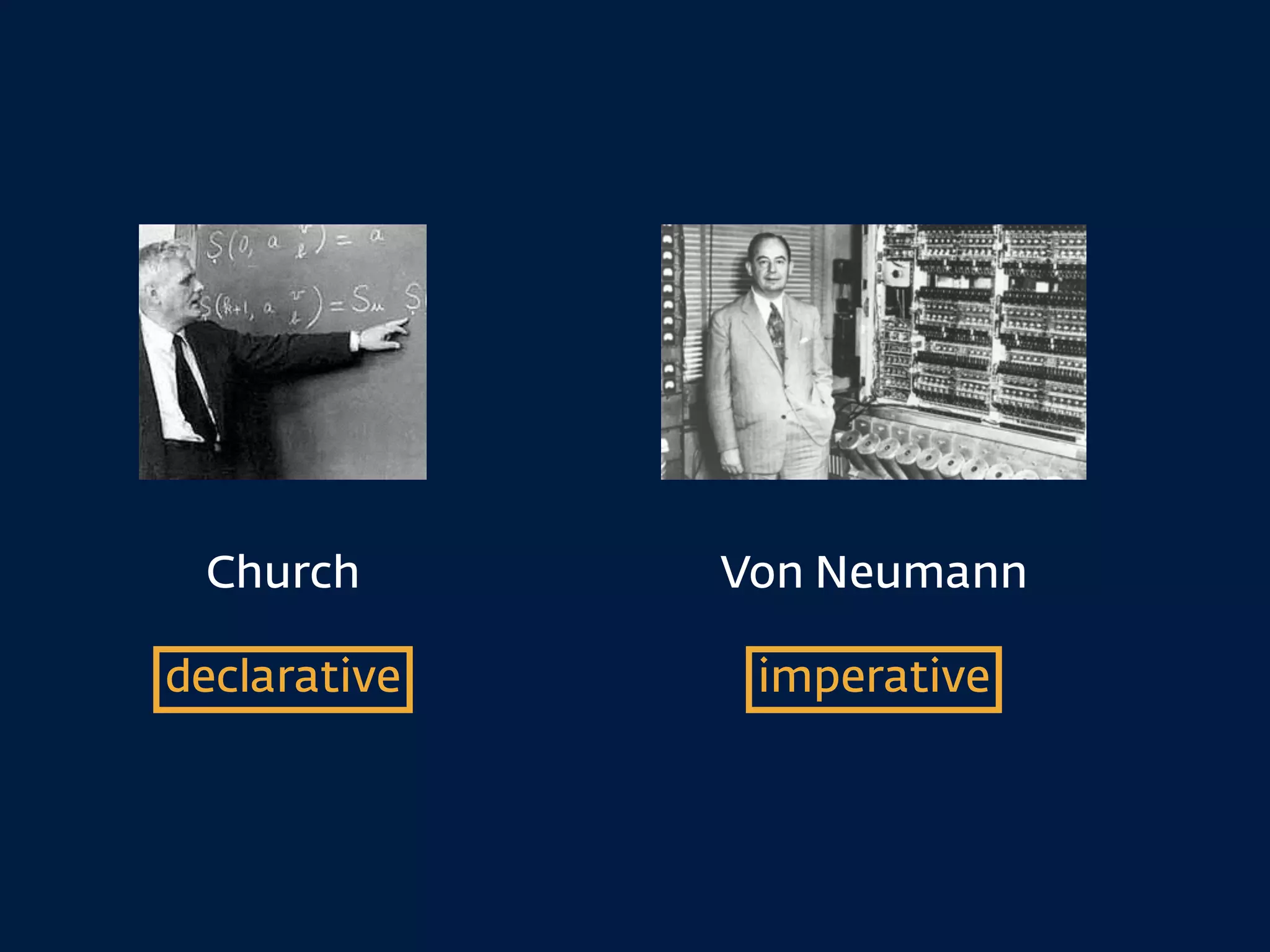
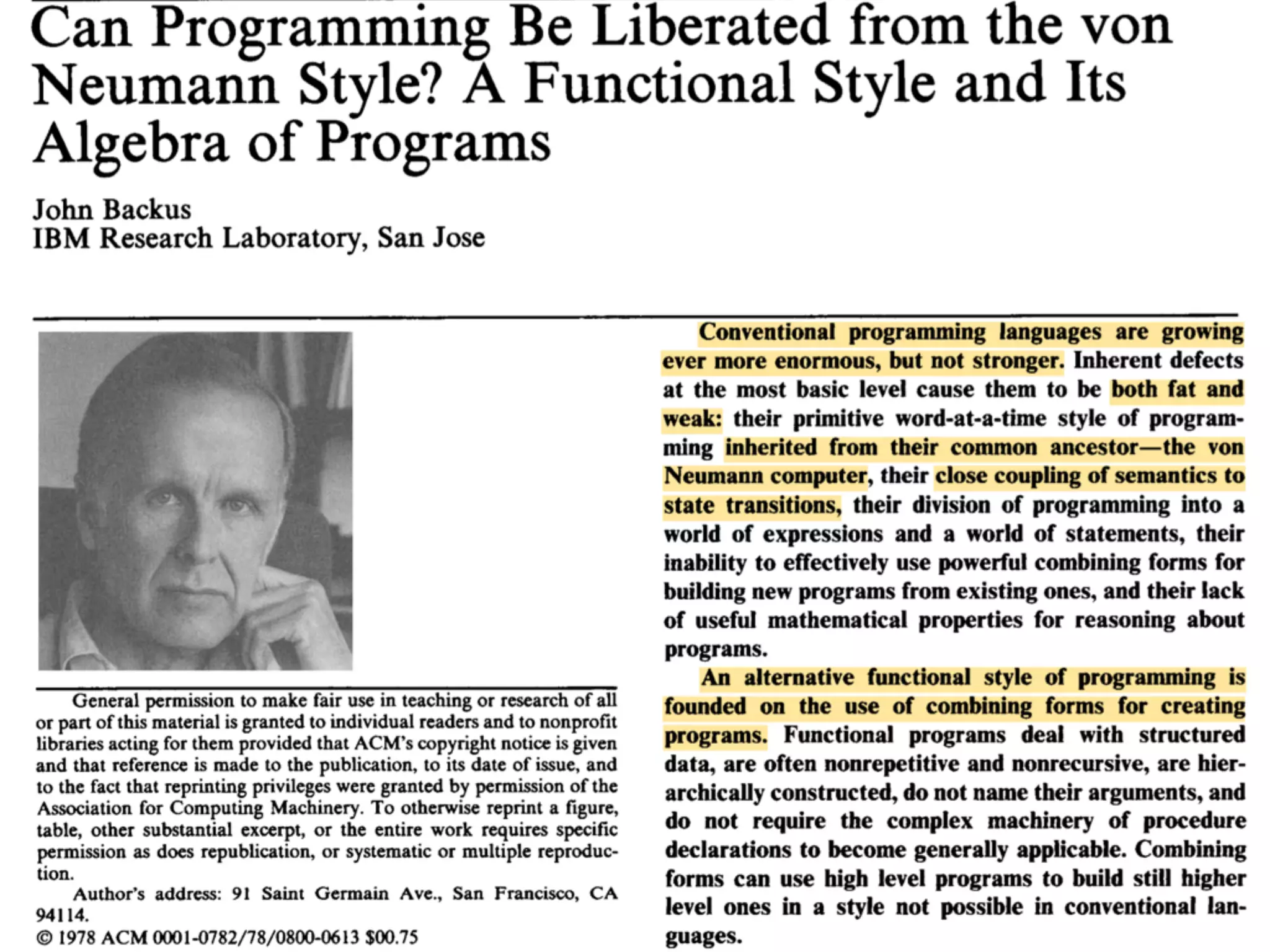
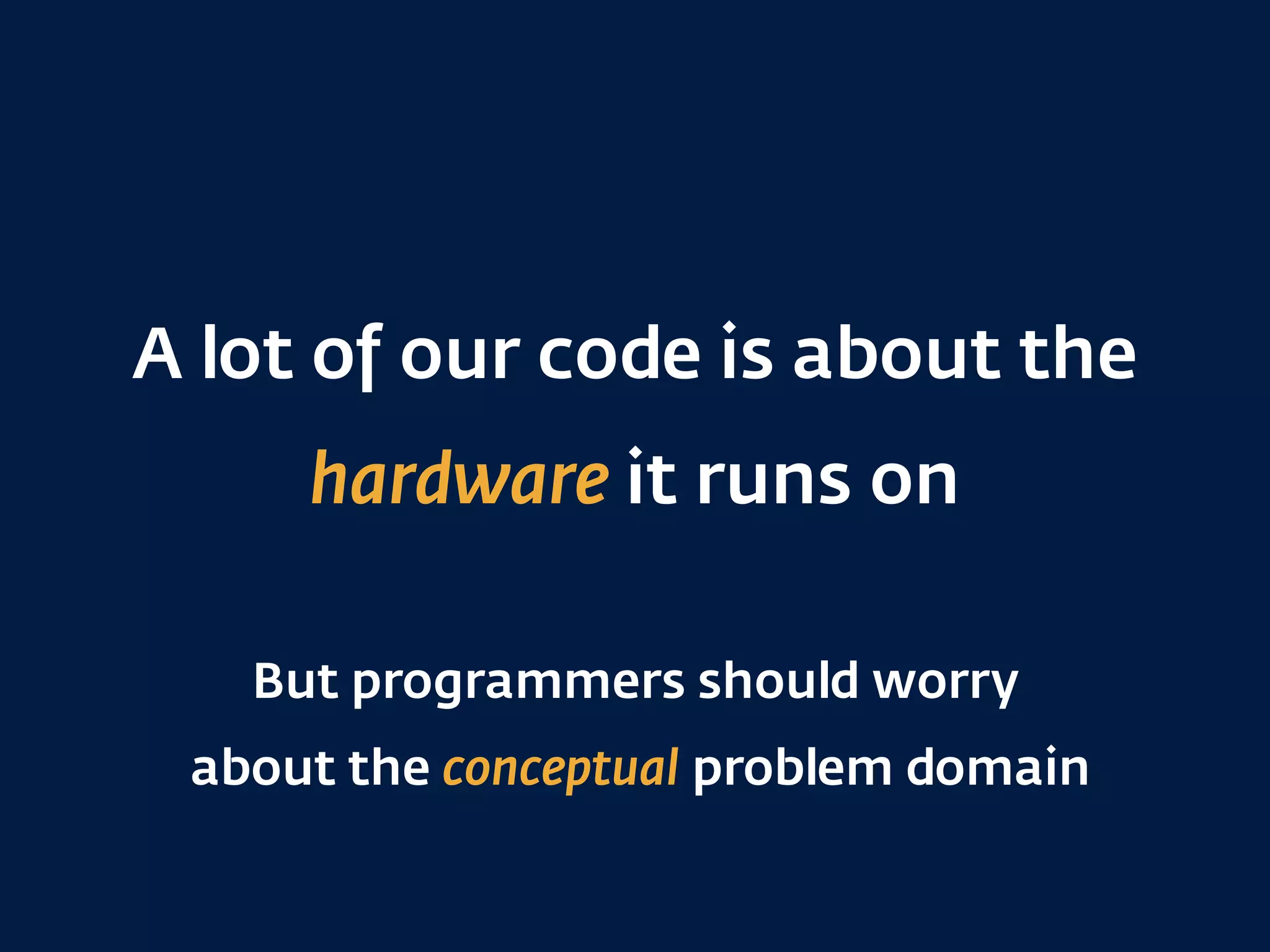
![Recursion-module(math).
-export([fac/1]).
fac(0) -> 1;
fac(N) -> N * fac(N - 1).
1> math:fac(9).
362880
function
calls itself](https://image.slidesharecdn.com/beingfunctionalinphpdpc2016-160625091624/75/Being-functional-in-PHP-DPC-2016-34-2048.jpg)
![Recursion fail-module(math).
-export([fac/1]).
fac(0) -> 1;
fac(N) -> N * fac(N - 1).
%%fac(9) = 9 * fac(9 - 1)
%% = 9 * 8 * fac(8 - 1)
%% = 9 * 8 * 7 * fac(7 - 1)
%% = 9 * 8 * 7 * 6 * fac(6 - 1)
%% = 9 * 8 * 7 * 6 * 5 * fac(5 -1)
%% = 9 * 8 * 7 * 6 * 5 * 4 * fac(4 - 1)
%% = 9 * 8 * 7 * 6 * 5 * 4 * 3 * fac(3 - 1)
%% = 9 * 8 * 7 * 6 * 5 * 4 * 3 * 2 * fac(2 - 1)
%% = 9 * 8 * 7 * 6 * 5 * 4 * 3 * 2 * 1 * fac(1 - 1)
%% = 9 * 8 * 7 * 6 * 5 * 4 * 3 * 2 * 1 * 1
%% = 9 * 8 * 7 * 6 * 5 * 4 * 3 * 2 * 1
%% = 9 * 8 * 7 * 6 * 5 * 4 * 3 * 2
%% = 9 * 8 * 7 * 6 * 5 * 4 * 6
%% = 9 * 8 * 7 * 6 * 5 * 24
%% = 9 * 8 * 7 * 6 * 120
%% = 9 * 8 * 7 * 720
%% = 9 * 8 * 5040
%% = 9 * 40320
%% = 362880
10 terms in
memory](https://image.slidesharecdn.com/beingfunctionalinphpdpc2016-160625091624/75/Being-functional-in-PHP-DPC-2016-35-2048.jpg)
![Tail recursion-module(math).
-export([tail_fac/1]).
tail_fac(N) -> tail_fac(N, 1).
tail_fac(0, Acc) -> Acc;
tail_fac(N, Acc) -> tail_fac(N - 1, N * Acc).
tail_fac(9) = tail_fac(9, 1).
tail_fac(9, 1) = tail_fac(9 - 1, 9 * 1).
tail_fac(8, 9) = tail_fac(8 - 1, 8 * 9).
tail_fac(7, 72) = tail_fac(7 - 1, 7 * 72).
tail_fac(6, 504) = tail_fac(6 - 1, 6 * 504).
tail_fac(5, 3024) = tail_fac(5 - 1, 5 * 3024).
…
tail_fac(0, 362880) = 362880
do calculation
before recursing](https://image.slidesharecdn.com/beingfunctionalinphpdpc2016-160625091624/75/Being-functional-in-PHP-DPC-2016-36-2048.jpg)


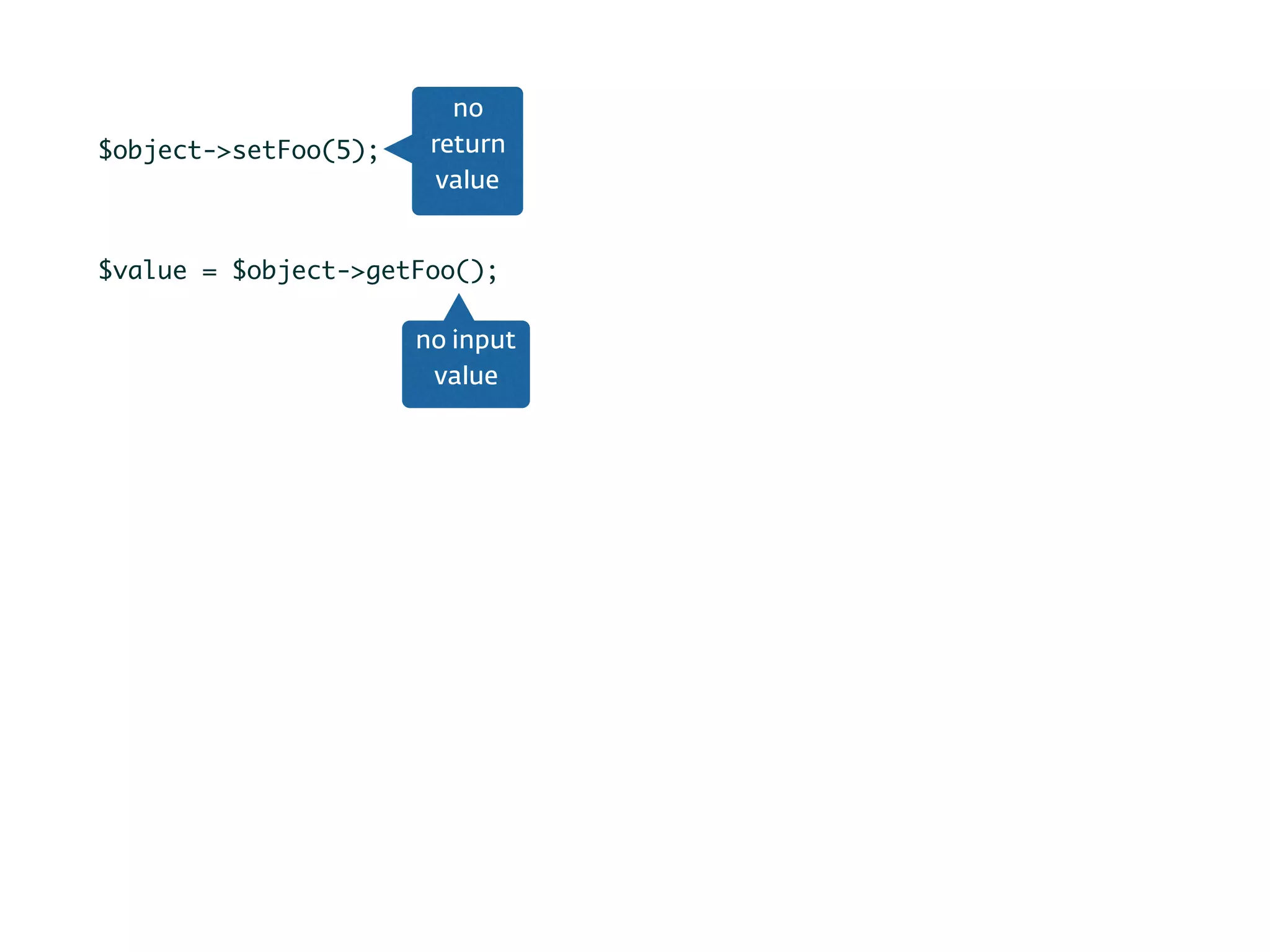
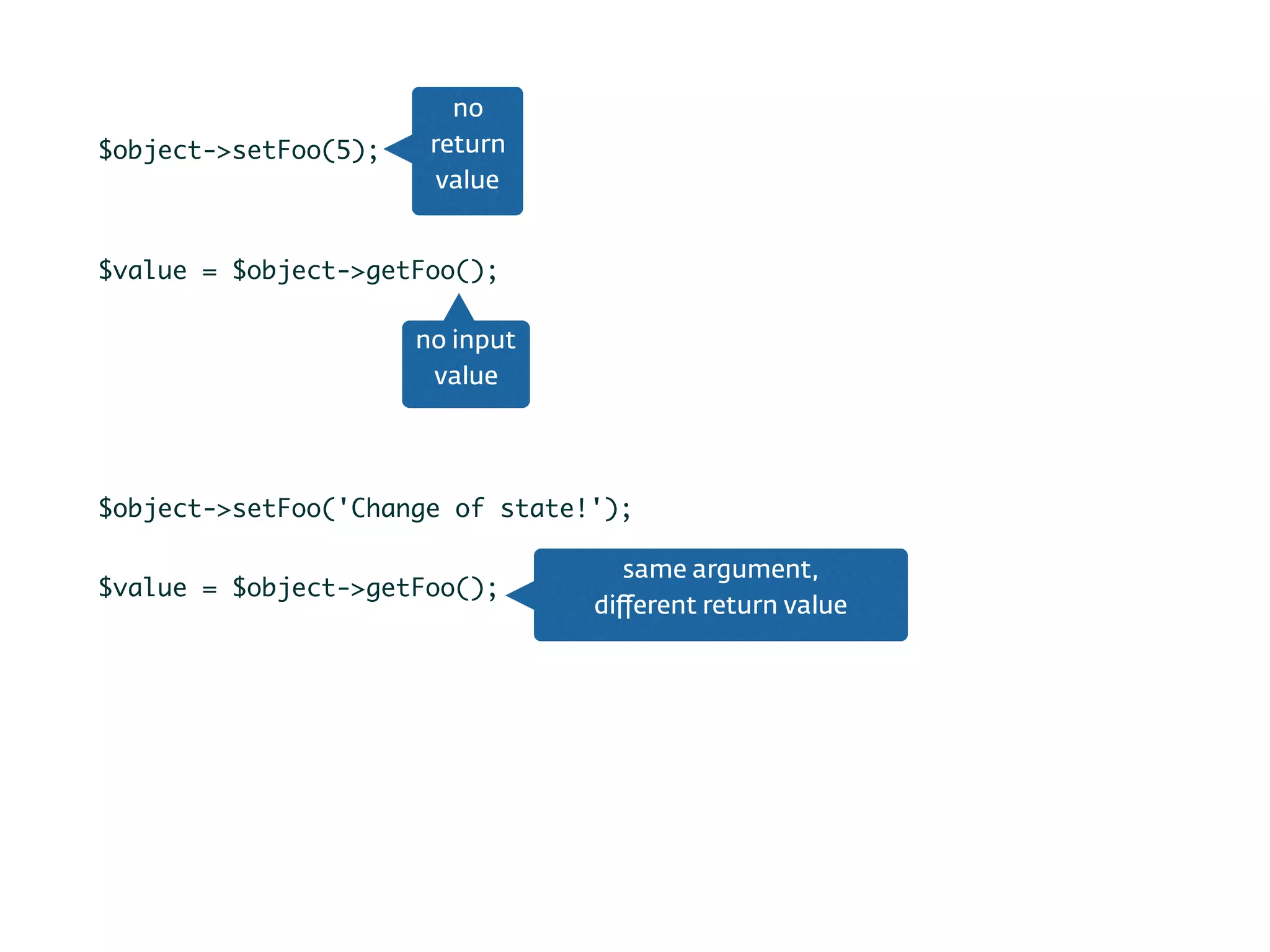
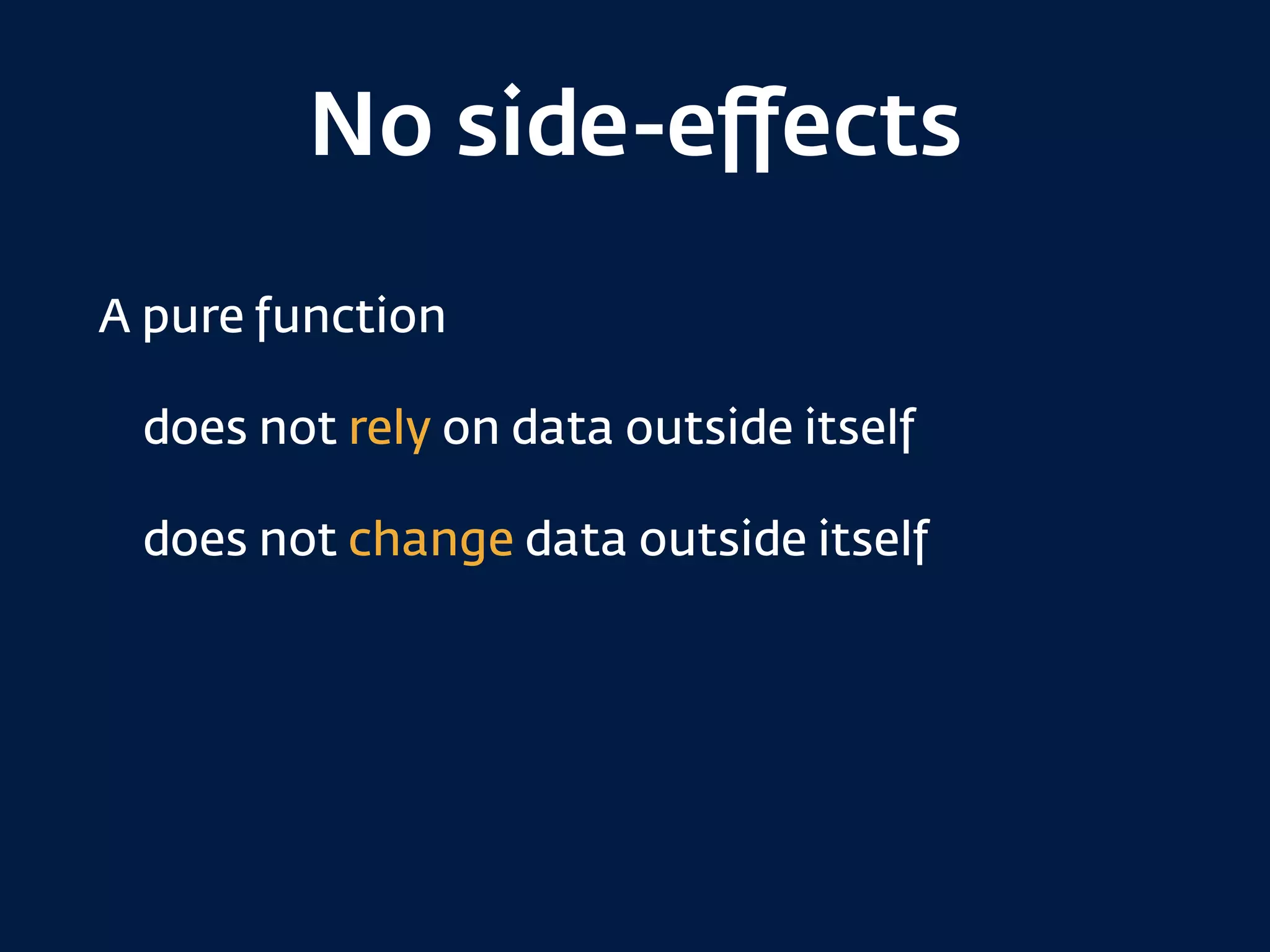
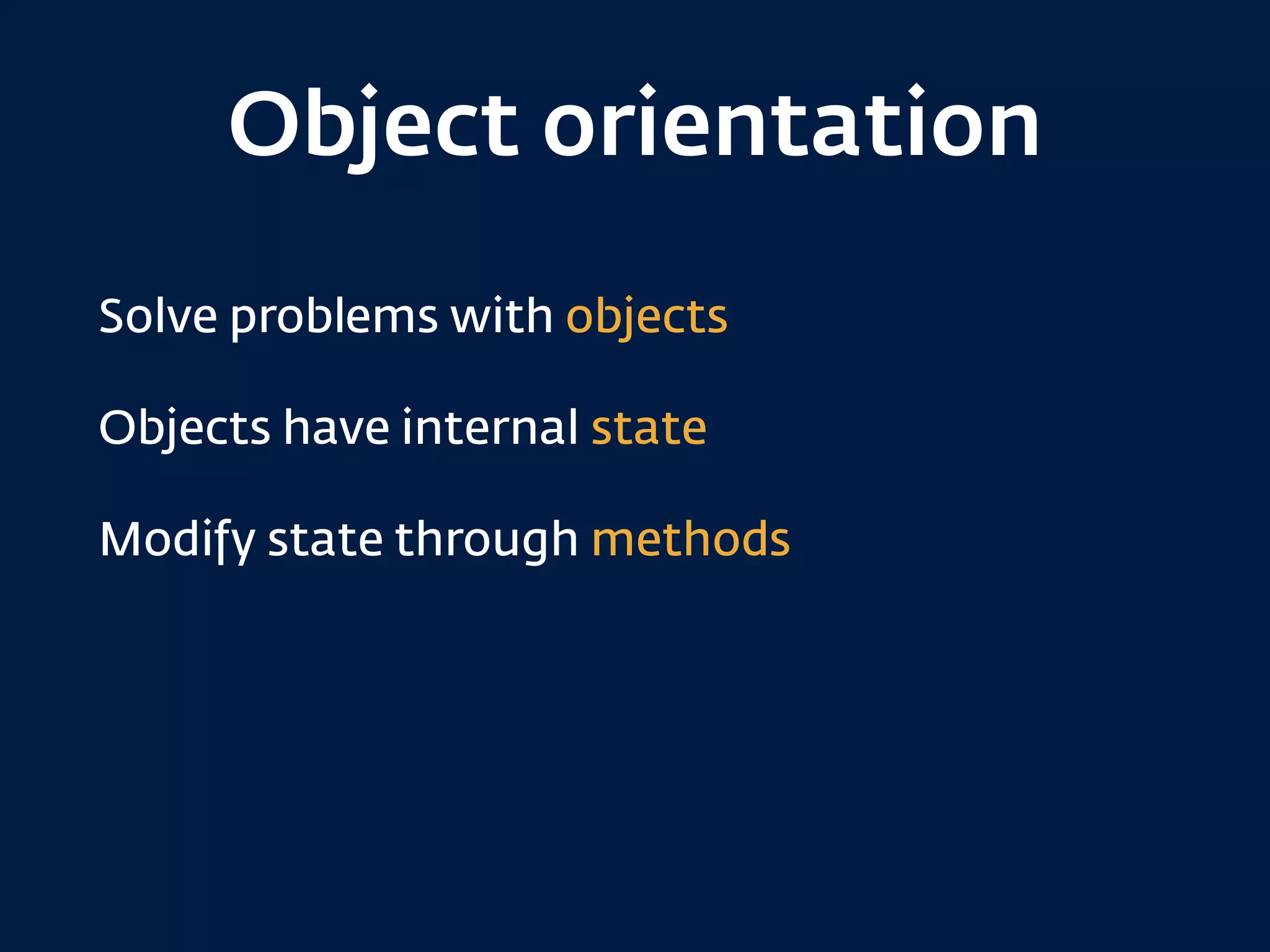
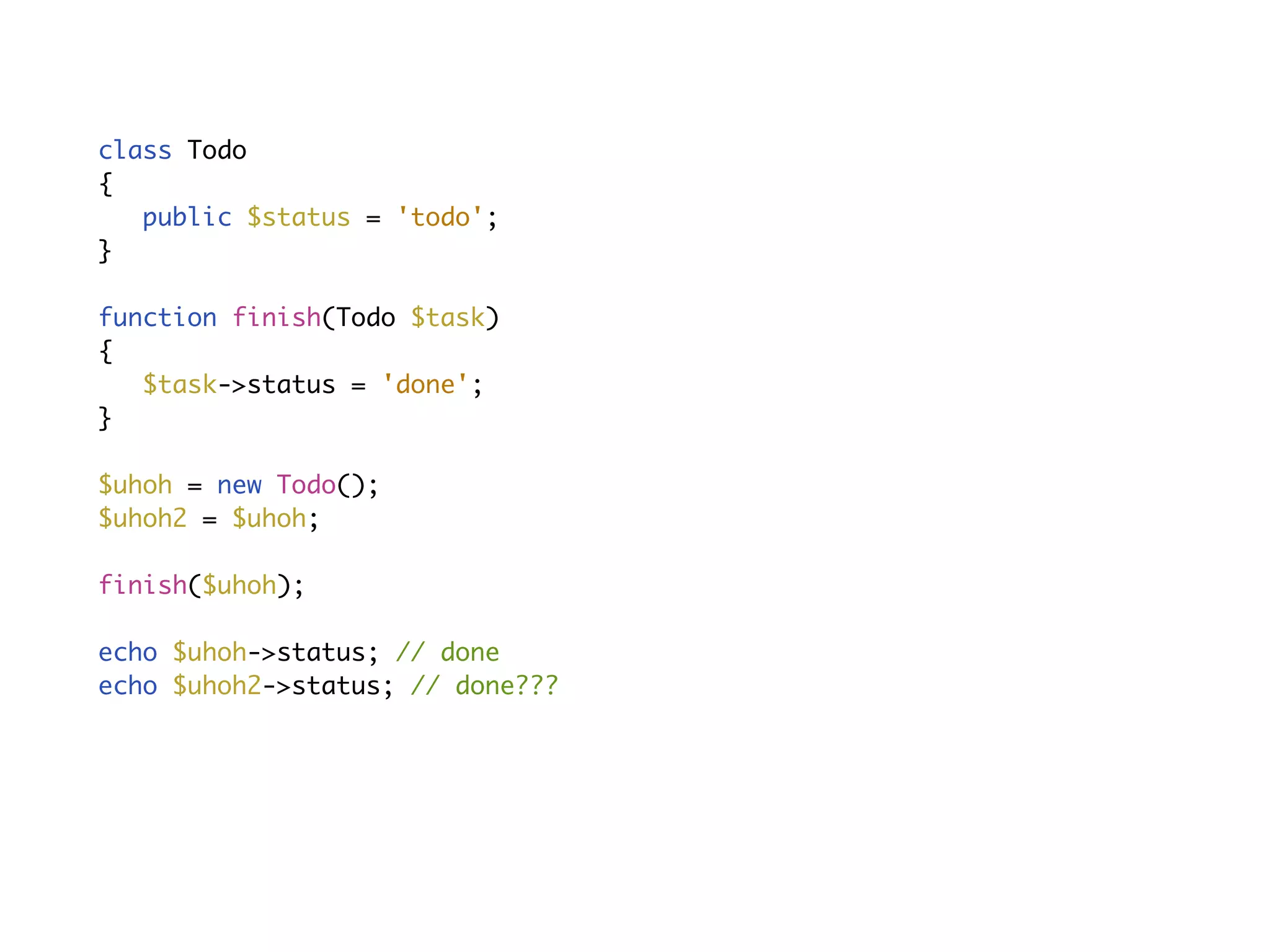
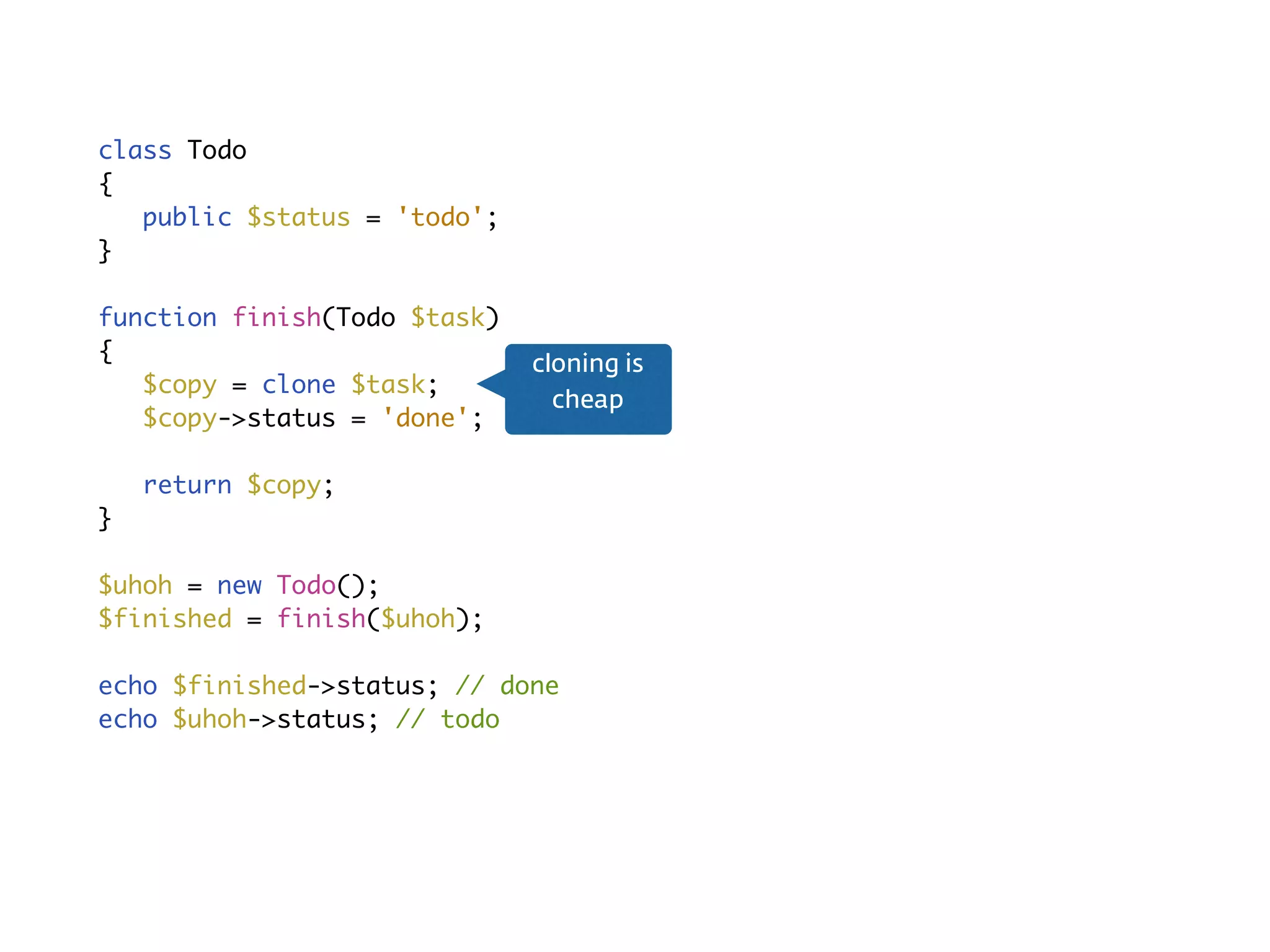

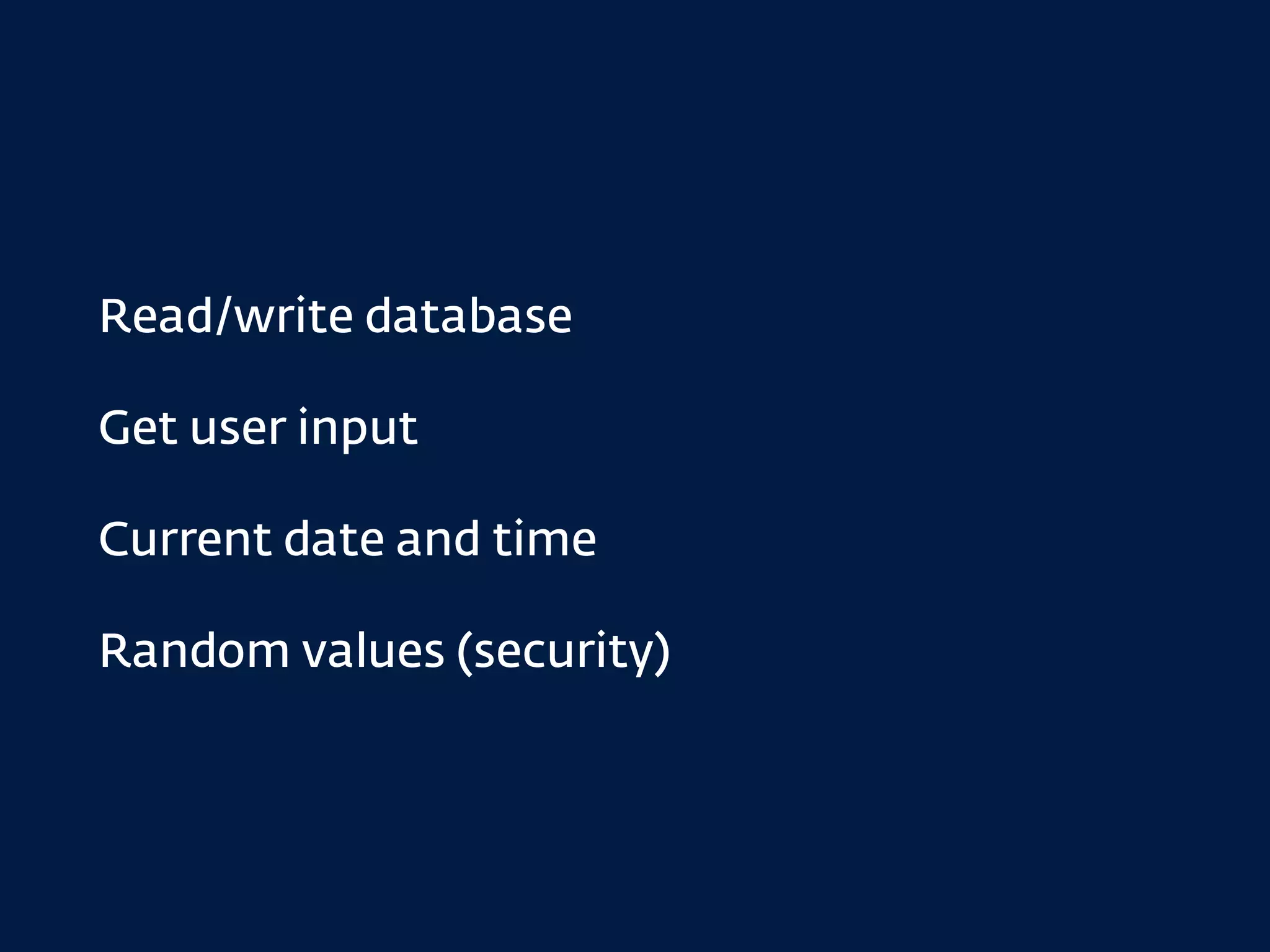
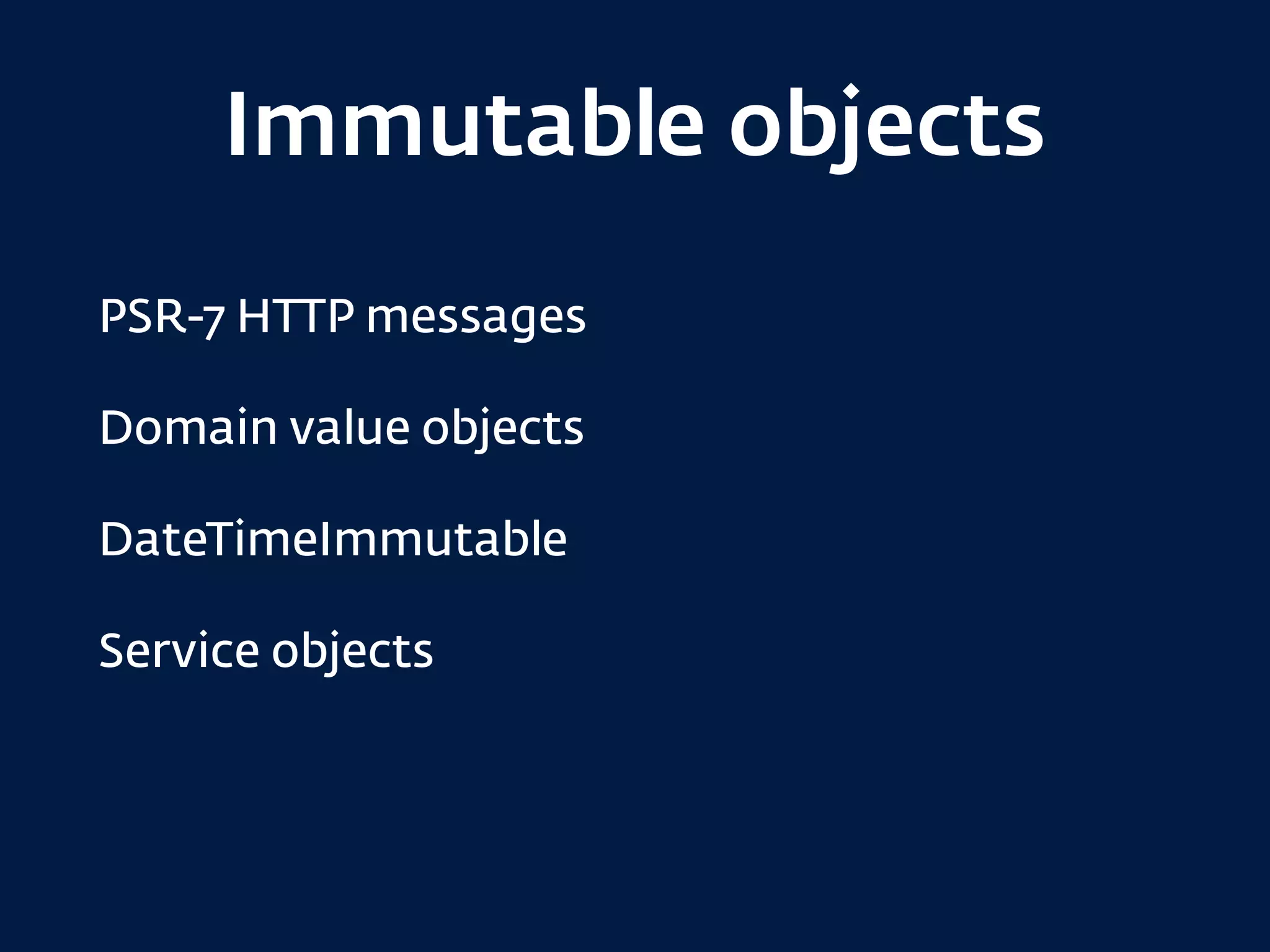
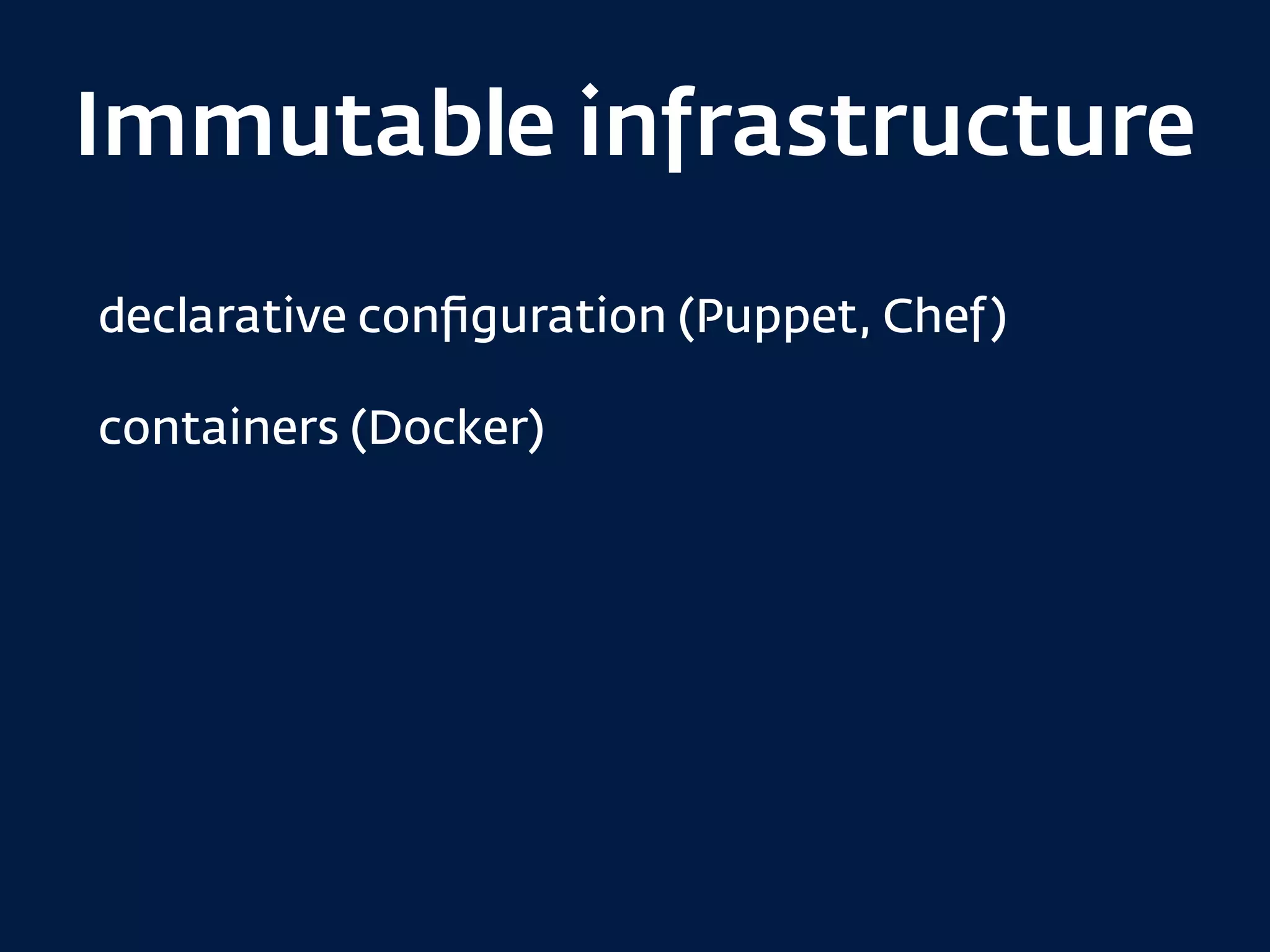

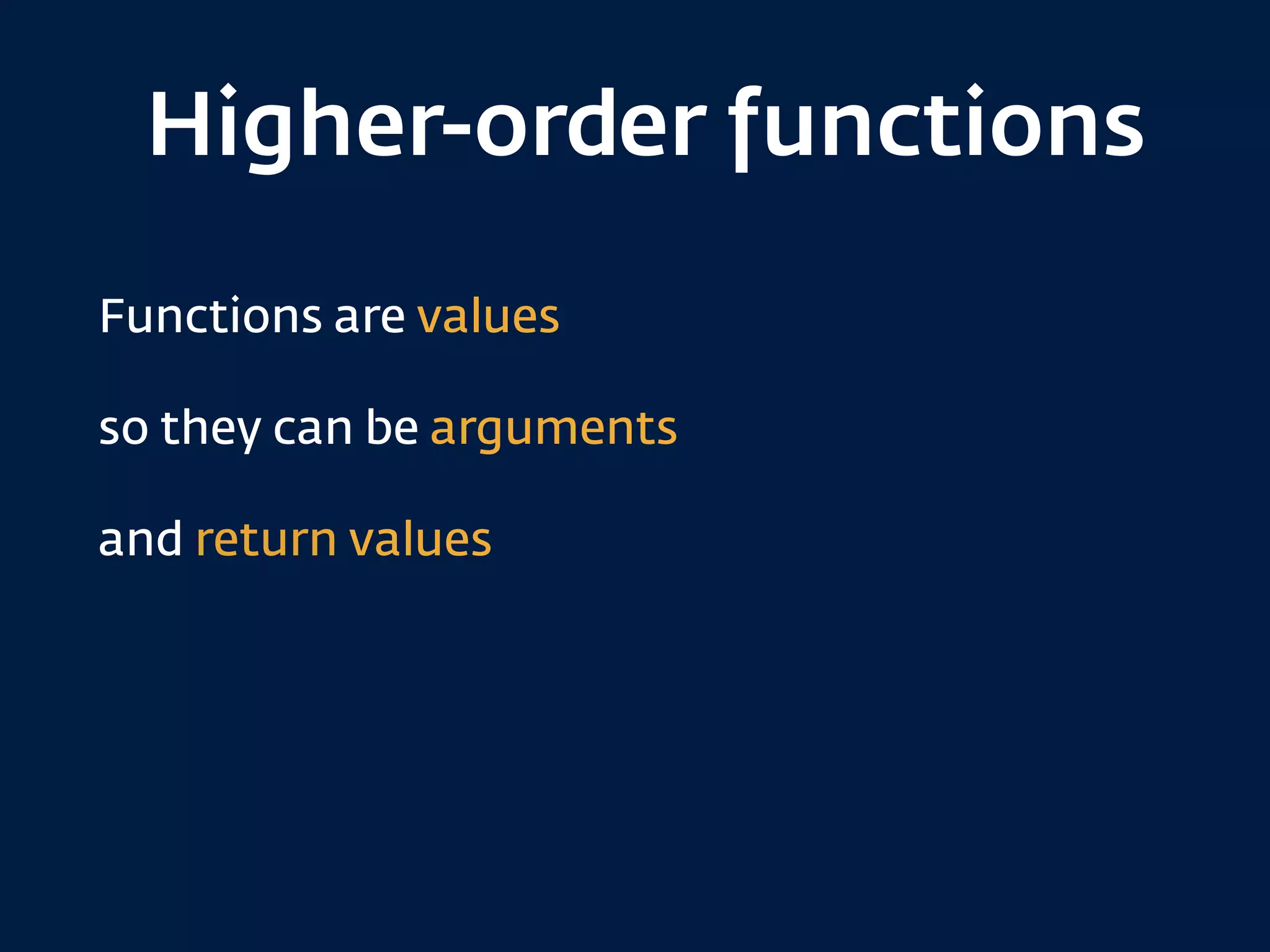
![$names = ['Billy', 'Bob', 'Thornton'];
$anonymise = anonymise('sha256');
var_dump(array_map($anonymise, $names));
// array(3) {
// [0]=>
// string(64) "85eea4a0285dcb11cceb68f39df10d1aa132567dec49b980345142f09f4cb05e"
// [1]=>
// string(64) "cd9fb1e148ccd8442e5aa74904cc73bf6fb54d1d54d333bd596aa9bb4bb4e961"
// [2]=>
// string(64) "d7034215823c40c12ec0c7aaff96db94a0e3d9b176f68296eb9d4ca7195c958e"
// }
using PHP built-ins](https://image.slidesharecdn.com/beingfunctionalinphpdpc2016-160625091624/75/Being-functional-in-PHP-DPC-2016-51-2048.jpg)
![$names = ['Billy', 'Bob', 'Thornton'];
$anonymise = anonymise('sha256');
var_dump(array_map($anonymise, $names));
// array(3) {
// [0]=>
// string(64) "85eea4a0285dcb11cceb68f39df10d1aa132567dec49b980345142f09f4cb05e"
// [1]=>
// string(64) "cd9fb1e148ccd8442e5aa74904cc73bf6fb54d1d54d333bd596aa9bb4bb4e961"
// [2]=>
// string(64) "d7034215823c40c12ec0c7aaff96db94a0e3d9b176f68296eb9d4ca7195c958e"
// }
function anonymise($algorithm)
{
return function ($value) use ($algorithm) {
return hash($algorithm, $value);
};
}
higher-order function
closure
using PHP built-ins
function as value
function as argument](https://image.slidesharecdn.com/beingfunctionalinphpdpc2016-160625091624/75/Being-functional-in-PHP-DPC-2016-52-2048.jpg)
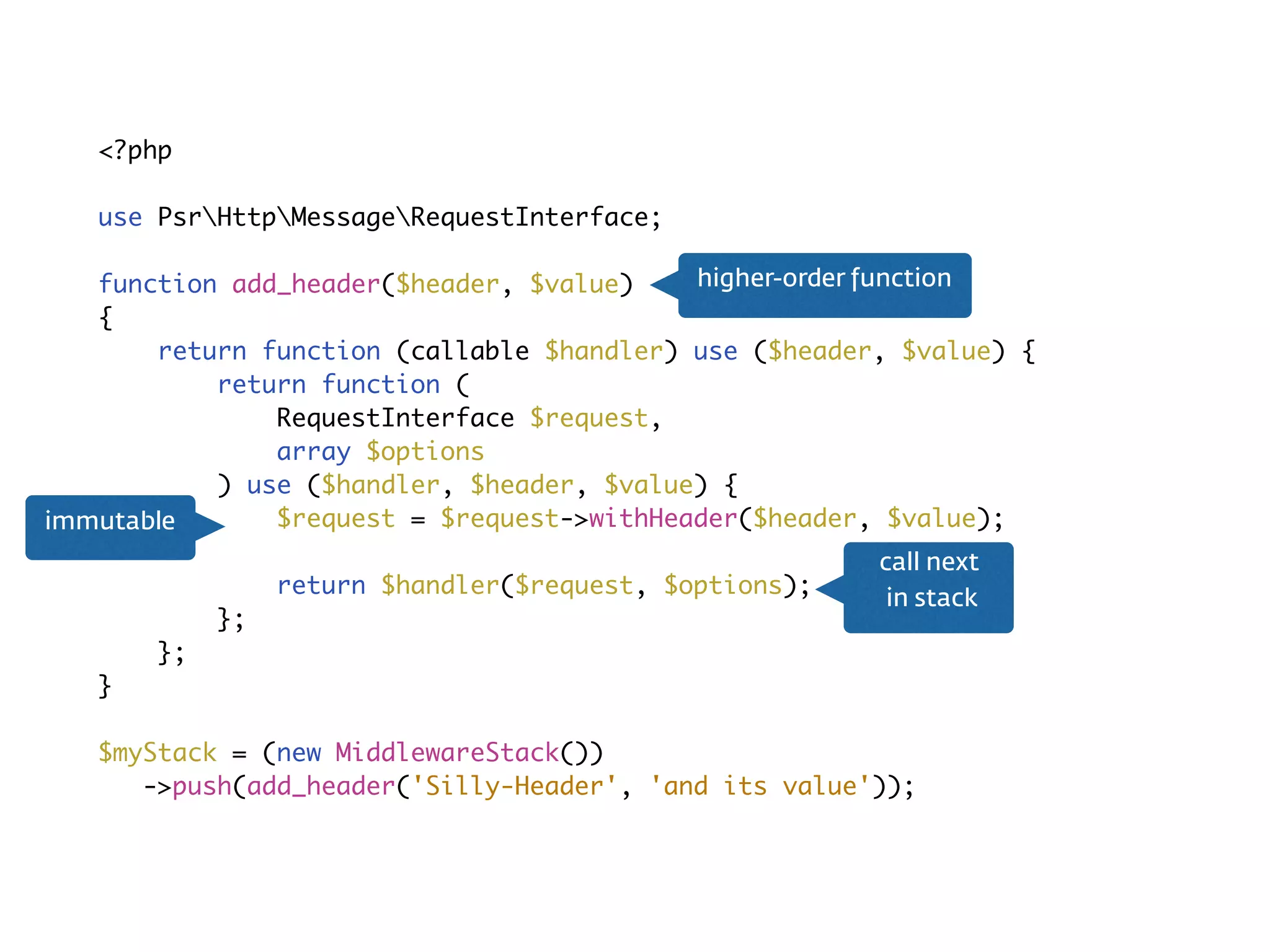
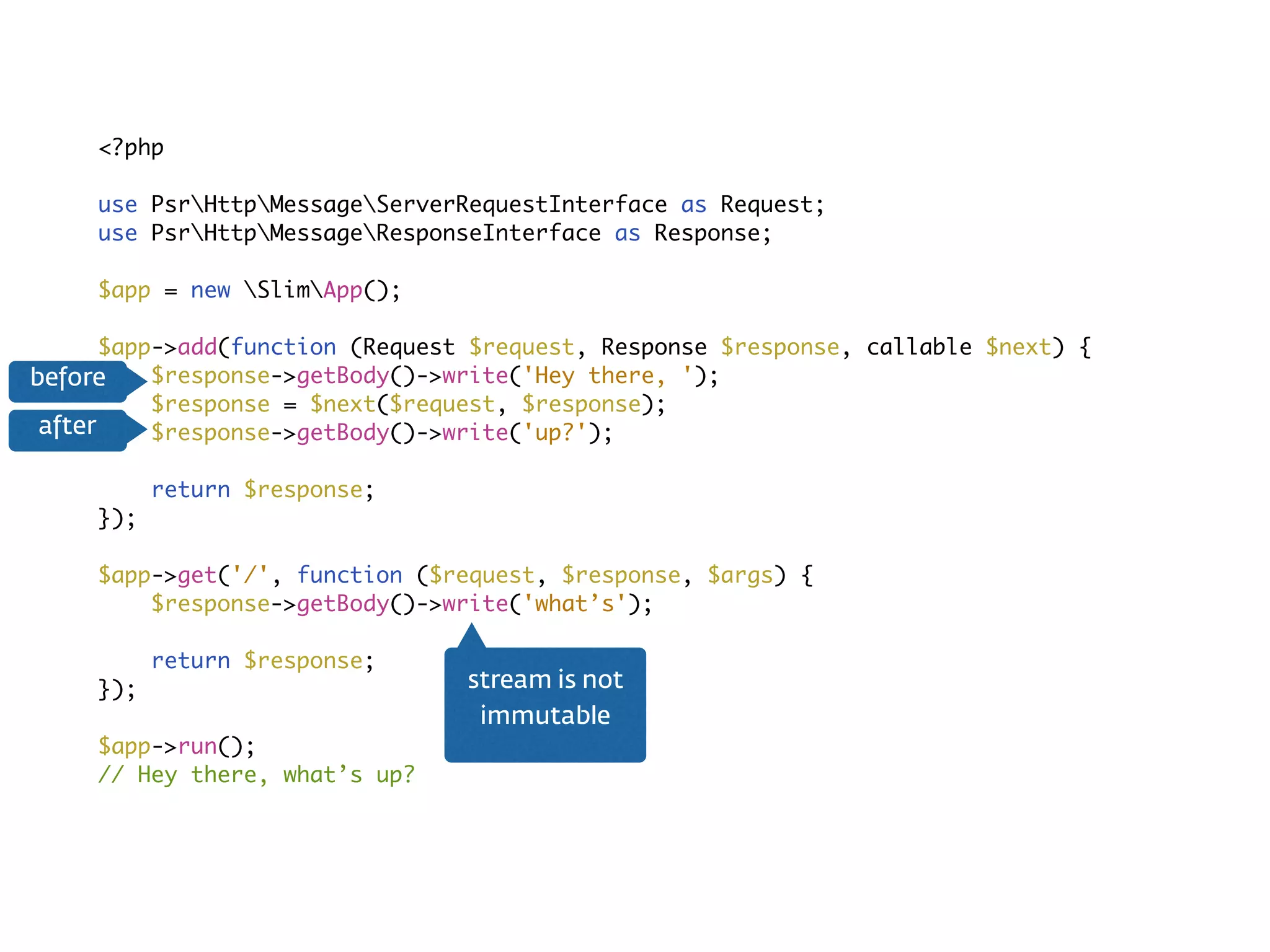
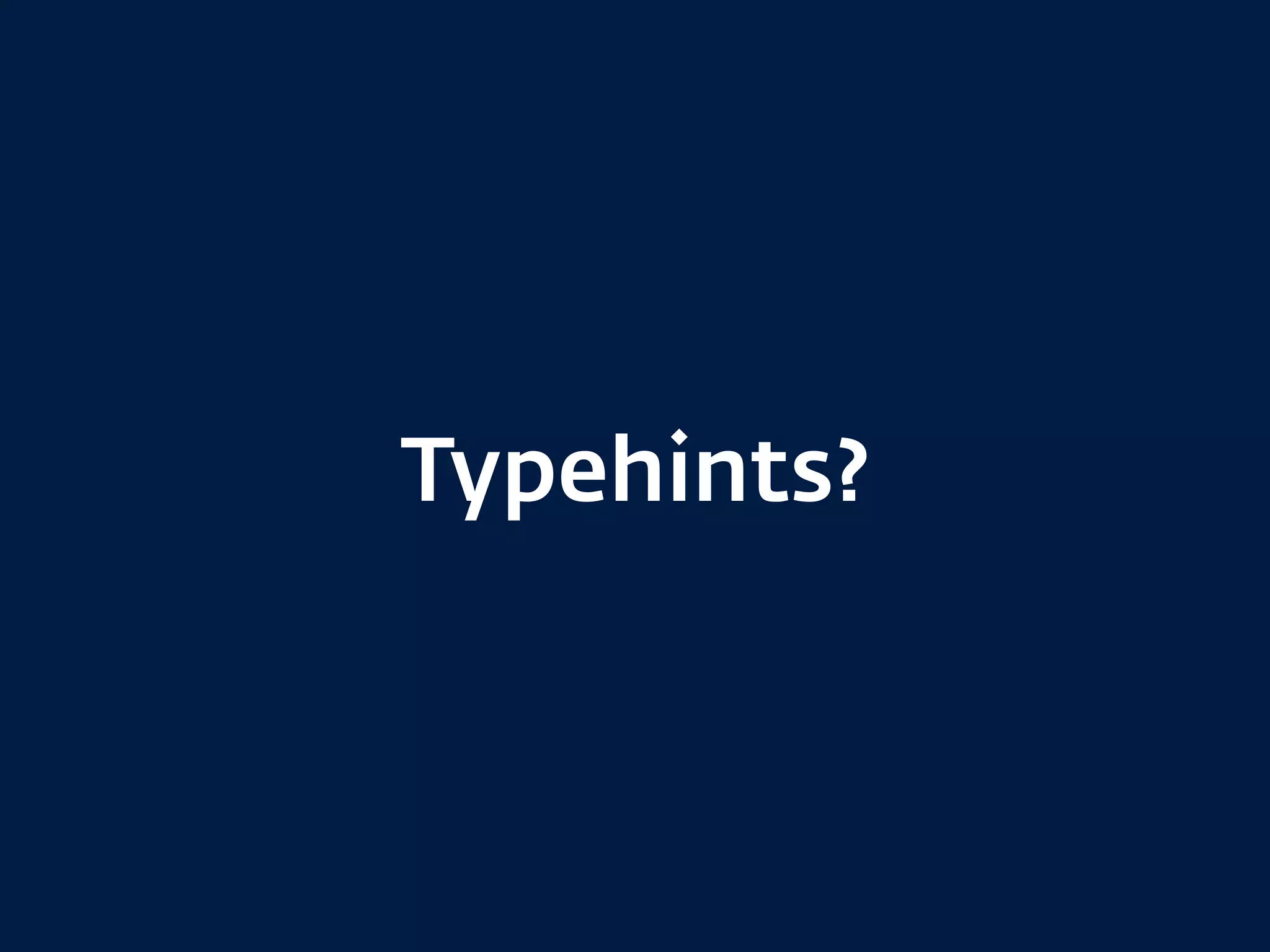
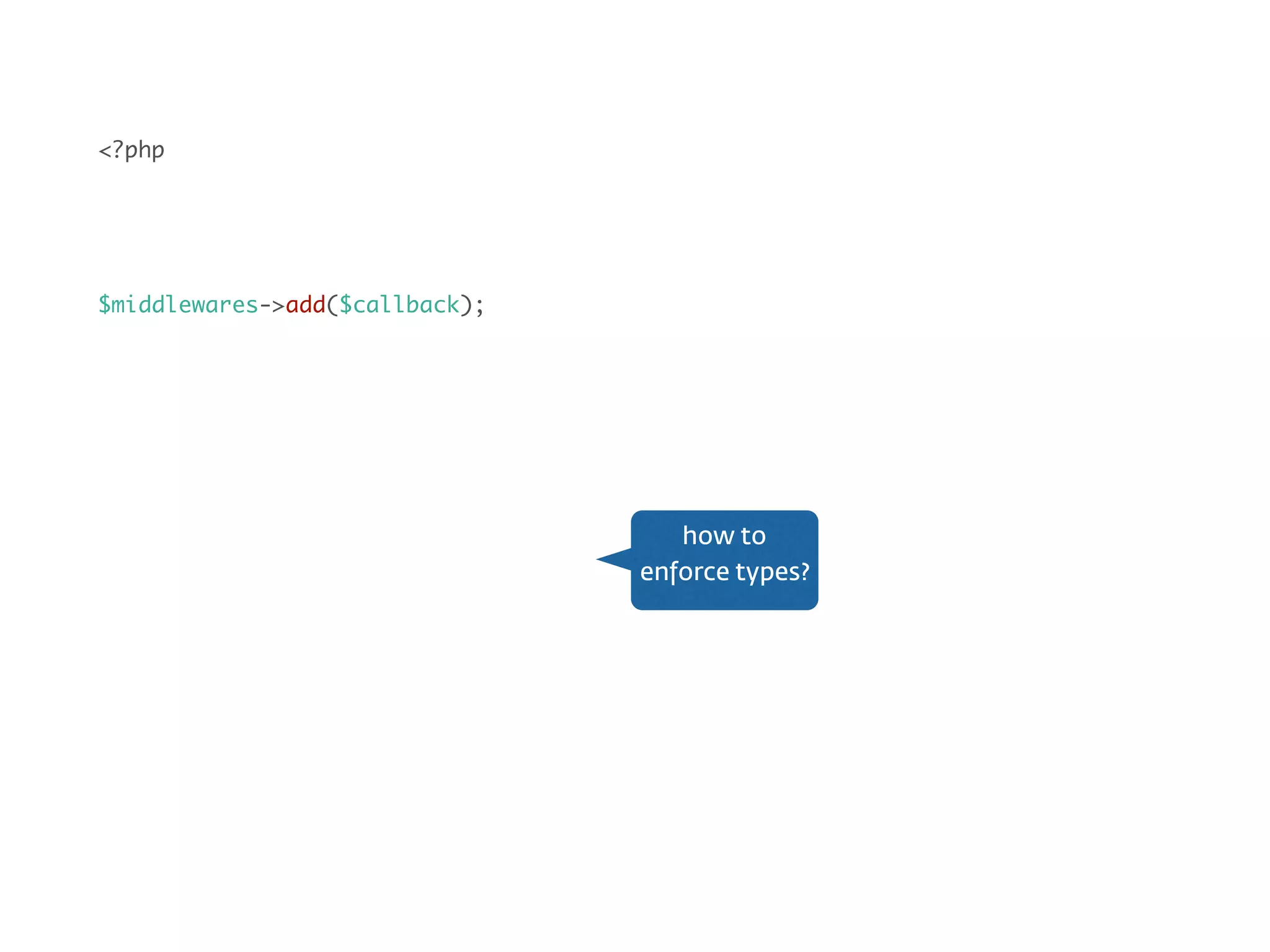
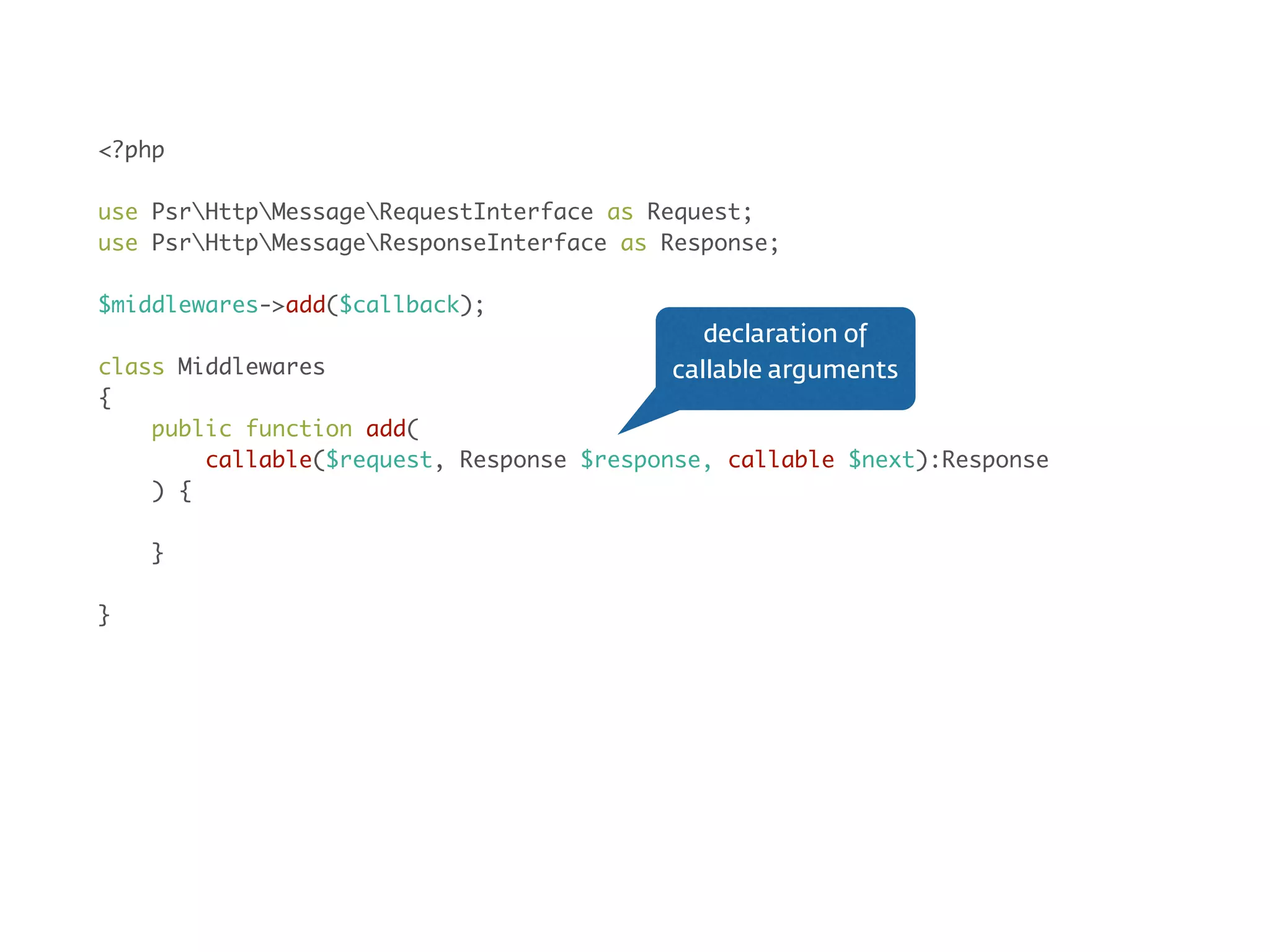
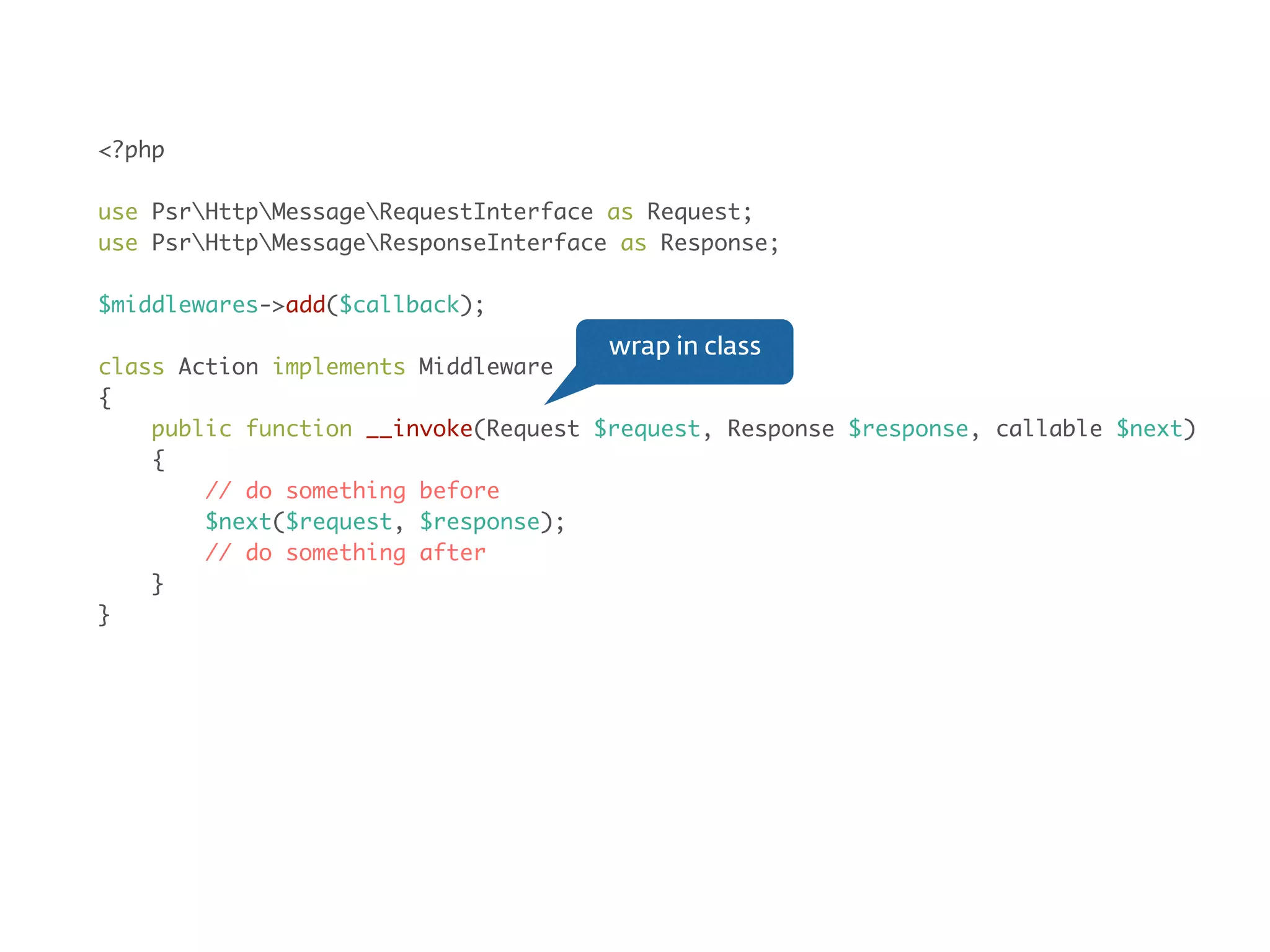
![Middleware<?php
$planets = [
[
"name" => "Earth",
"order" => 3,
"has" => ["moon", "oreos"],
"contact" => [
"name" => "Bob Spongebob",
"email" => "bob@spongebob.earth"
]
],
[
"name" => "Mars",
"order" => 4,
"has" => ["aliens", "rover"],
"contact" => [
"name" => "Marvin Martian",
"email" => "marvin@theparanoidandroid.mars"
]
],
// ...
];
$nameOfContact = P::compose(P::prop('name'), P::prop('contact'));
$getContactNames = P::map($nameOfContact);
// Application
$contacts = $getContactNames($planets);
P::toArray($contacts);
//=> ["Bob Spongebob", "Marvin Martian", ...]
returns a
generator](https://image.slidesharecdn.com/beingfunctionalinphpdpc2016-160625091624/75/Being-functional-in-PHP-DPC-2016-59-2048.jpg)
